It’s not the first time me and my family have lived abroad, neither is it the first time we have visited Bali. Still, you always have expectations, even when trying not to. To start with, I always struggle with camera choices – usually as a consequence of what I expect to shoot at. Through the years I have been diminishing my equipment to the point where I usually travel with a 35mm camera (Contax G1), and one lens; in this case I brought two bodies and two lenses, the 28 and the 45.
Additionally I also brought the Polaroid 195 and about 20 packs of instant film. Not knowing what I would shoot or if I would shoot it at all, I brought what I thought was not too much and not too little. To be honest, I was not very enthusiastic about bringing the Polaroid with me, as I’ve not been out shooting with it for years! But then, during our farewell party, I shot few pictures with the Polaroid and I loved how they looked, and well, I have fond memories of the of this camera too.
The farewell party shots (FP100c -I am not entirely sure why I deleted the framing of the Polaroids, but I guessed I had a reason…):
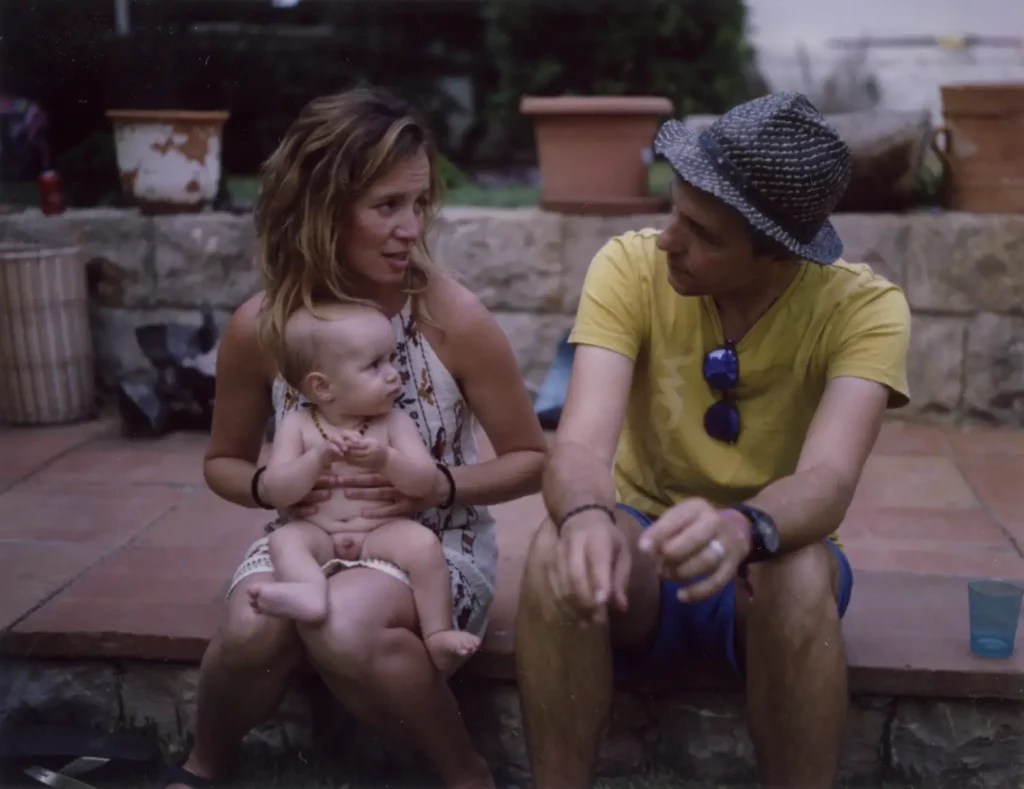
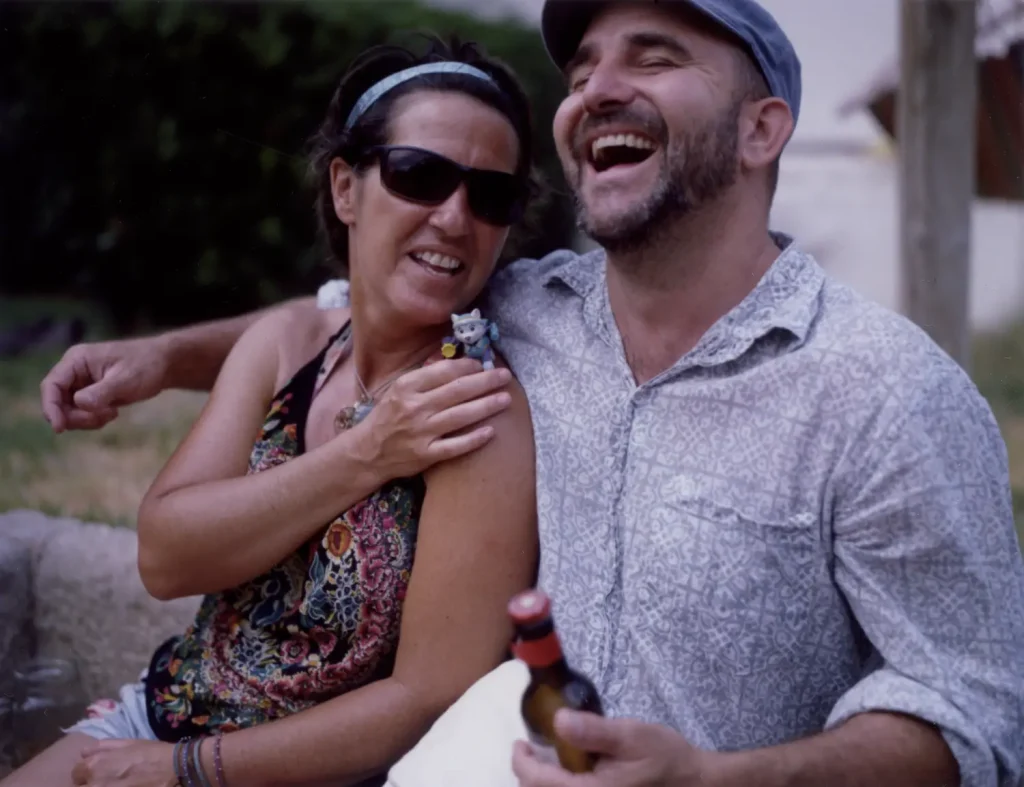
My Polaroid film supply at home is mostly comprised of Fuji FP3000b, FP100b and FP100c. I also still have some Polaroid 108; Sepia and Chocolate. Some films age better than others, FP100c no problem at all; FP3000b so so; and FP100b is no problem now I am rating it at ISO400 instead of ISO100. I decided to bring with me FP100b, FP100c and the 108 (expired in 2000).
I also brought with me few Portra 400 and TriX 400 rolls for the Contax G1, I should have brought some Cinestill 800; it would have been just perfect for the interiors I’ve found myself shooting.
When I am travelling with film, specially with instant film, I try not to think much about the airport’s X-ray machines, heat and cold during the flight and so on, but I still think about it. I put the 20 packs in my suitcase and off I went with my family.
One tip; if you are shooting Polaroid film do not pay the prices on ebay, it might discourage from keep shooting…
Arriving in Bali
When one arrives in Bali everything looks and feels exotic, the luxurious rice paddies, people working on them, the temples with religious ceremonies, surfers, etc. As I always remind myself, it’s very easy to fall into the clichés. How many times has a rice paddy been photographed? Sure somebody can find a creative and innovative way to shoot them, or develop an original narrative, but then, even if I pictured myself riding the island with my bike in search of interesting people and places, I secretly knew that it was not going to happen, I did not imagine myself telling my partner, once and again, “I leave in search of creativity”!
And at the end it, there might have been just one more photography book about Bali, even if it was made with Polaroids. I believe the medium does not justify a lack of originality or creativity.
As I was told, shots like there look like postcards:
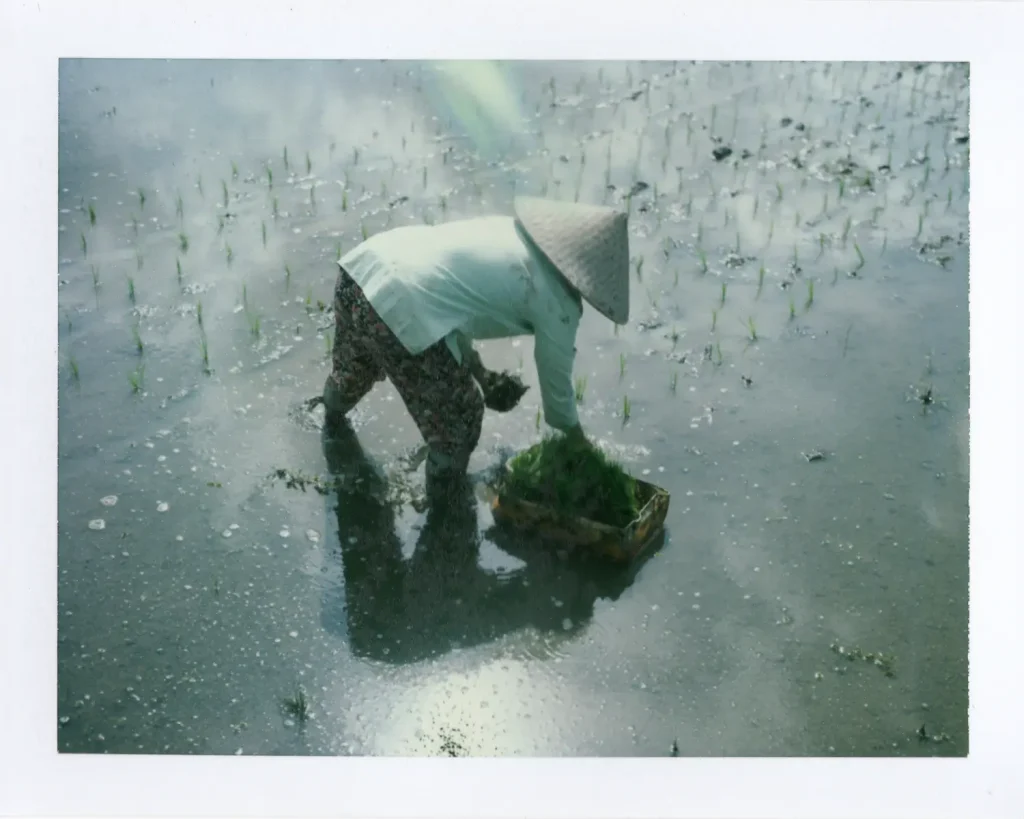
What to shoot?
After the initial excitement of being surrounded by exoticism and two “wasted” packs of fp100c packs, I slowed down and waited for inspiration. I considered jumping into a Kite project? Bali has a wonderful Kite culture, very colorful, very visual. In the end I did not fall into it.
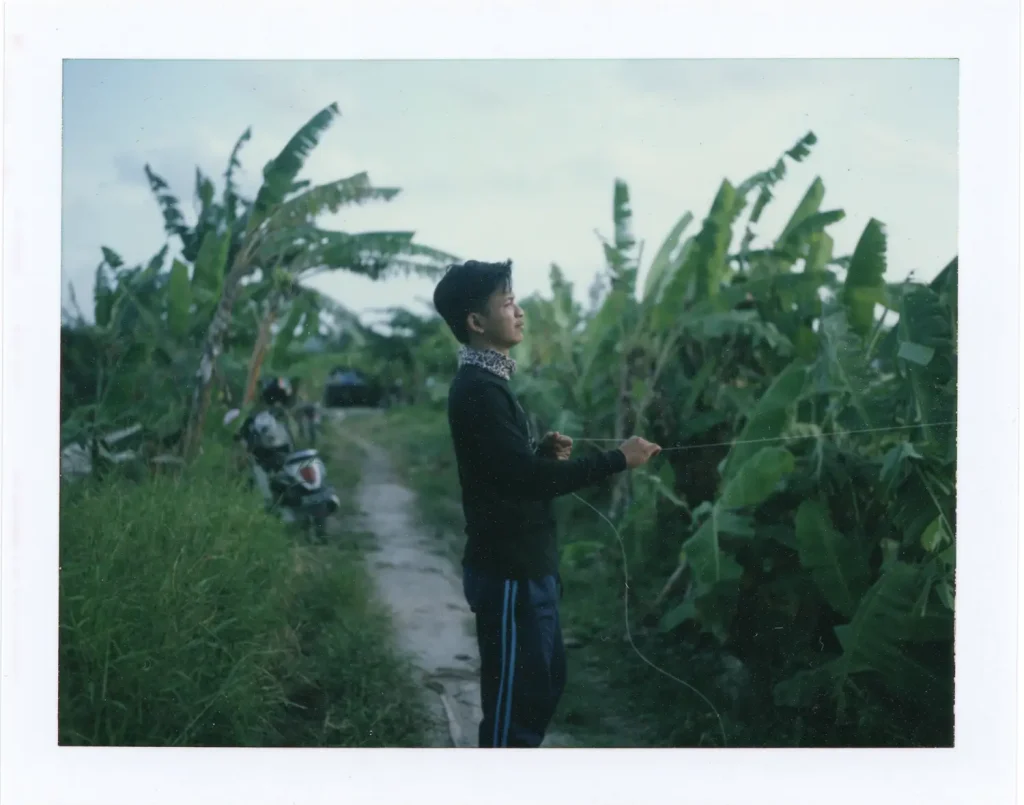
Finding a project
What happened next was that I started looking for a custom motorcycle. After couple of days of being in Bali I spotted few of them, which I would say is uncommon where I come from (Spain), so I decided I might get one. Is there anything cooler than a custom motorcycle? I started visiting workshops, the mainstream ones, the ones mostly frequented by expats.
As they were out of my budget I kept visiting more garages and the idea came to me. Why not photograph the vibrant custom motorcycle scene in Bali? I mean, Polaroid, custom motorcycles and exotic Bali, can it get any better?! With a growing idea on how I would proceed I started shooting. The pictures below are the first ones I shot.
Treasure Custom Motorcycle
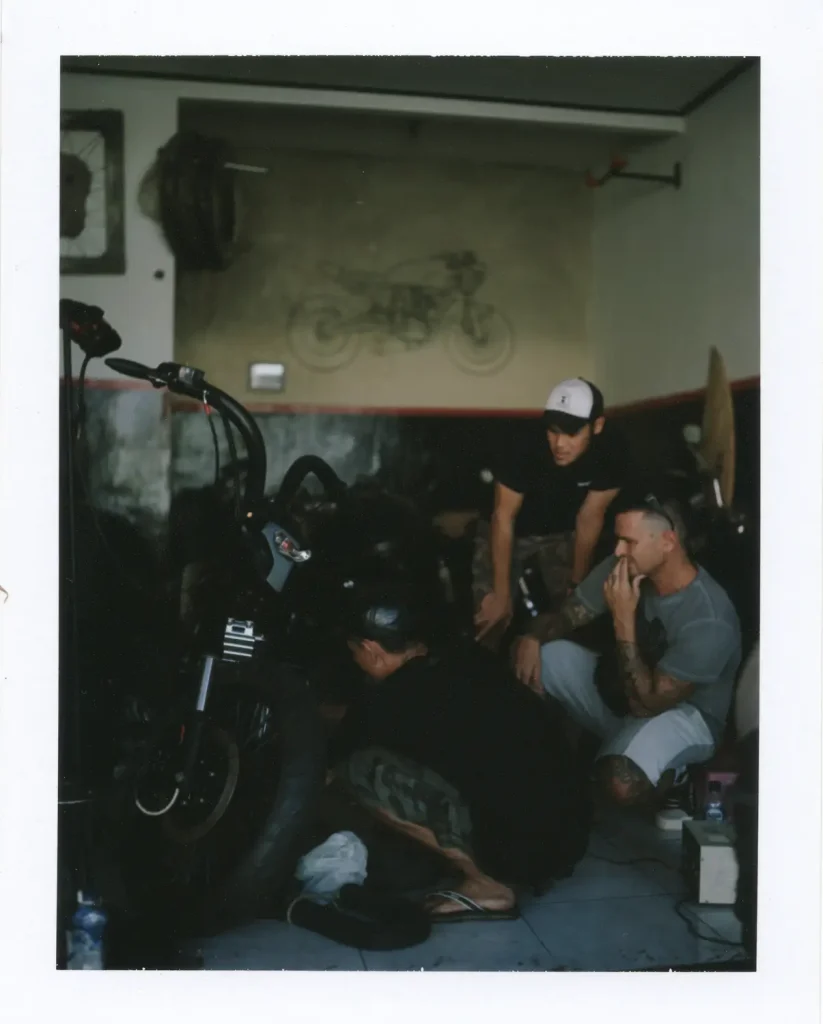
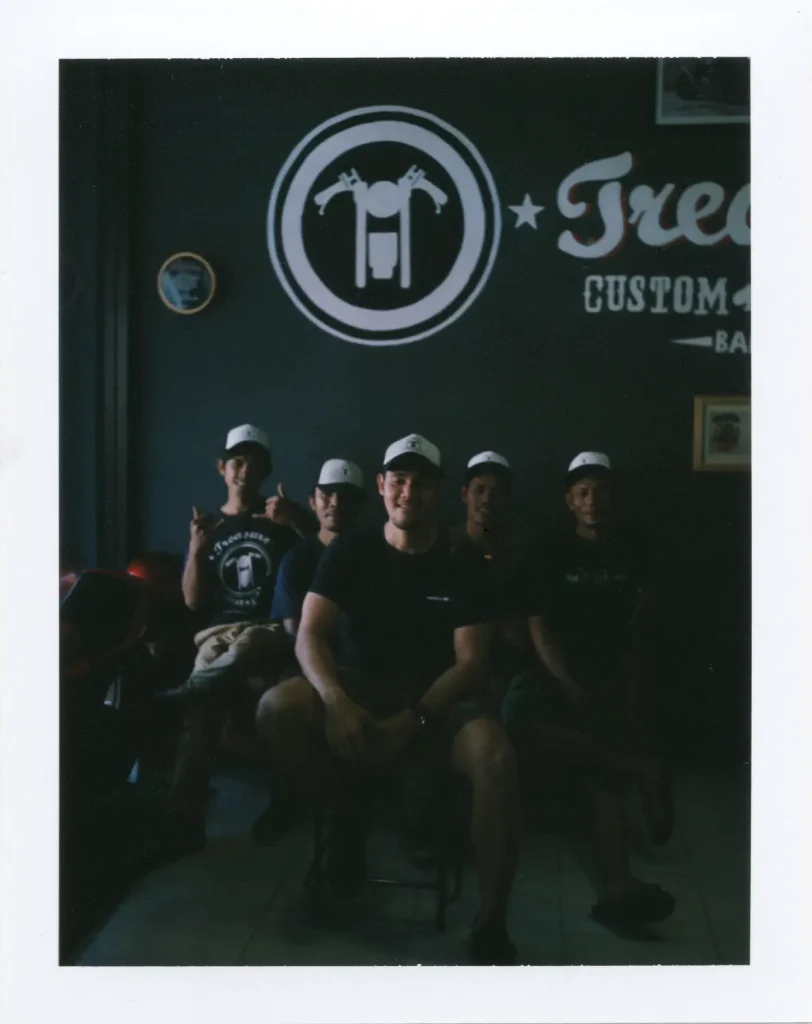
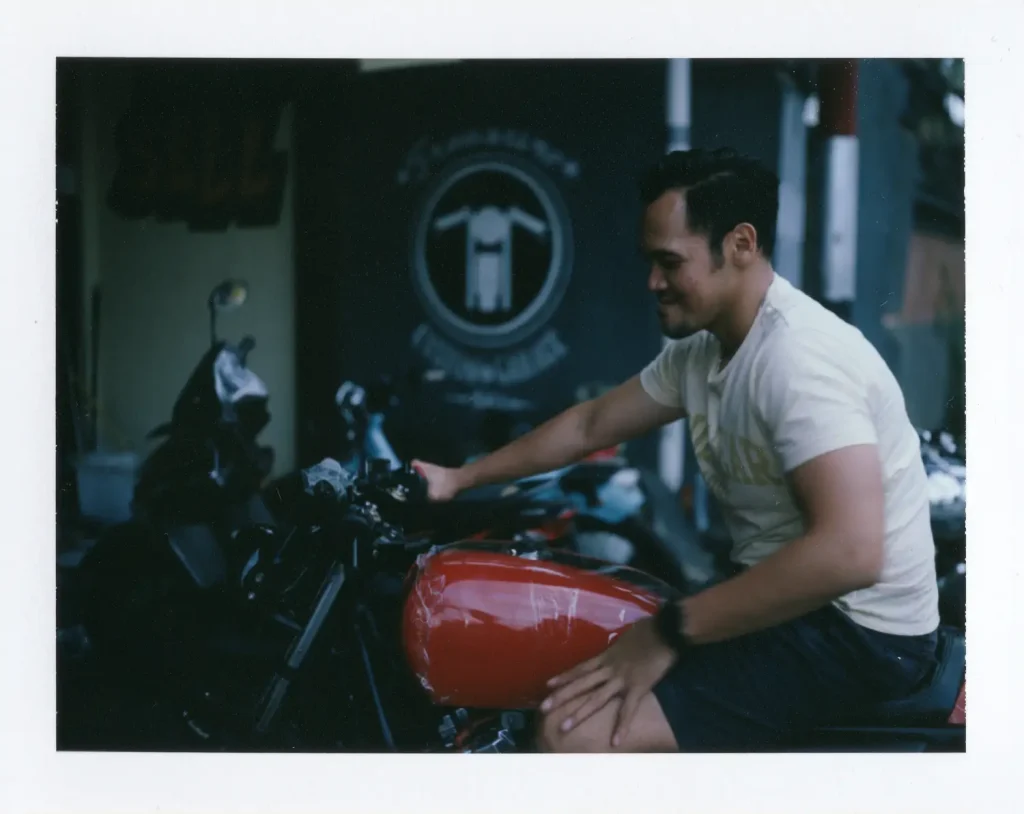
Benk Garage
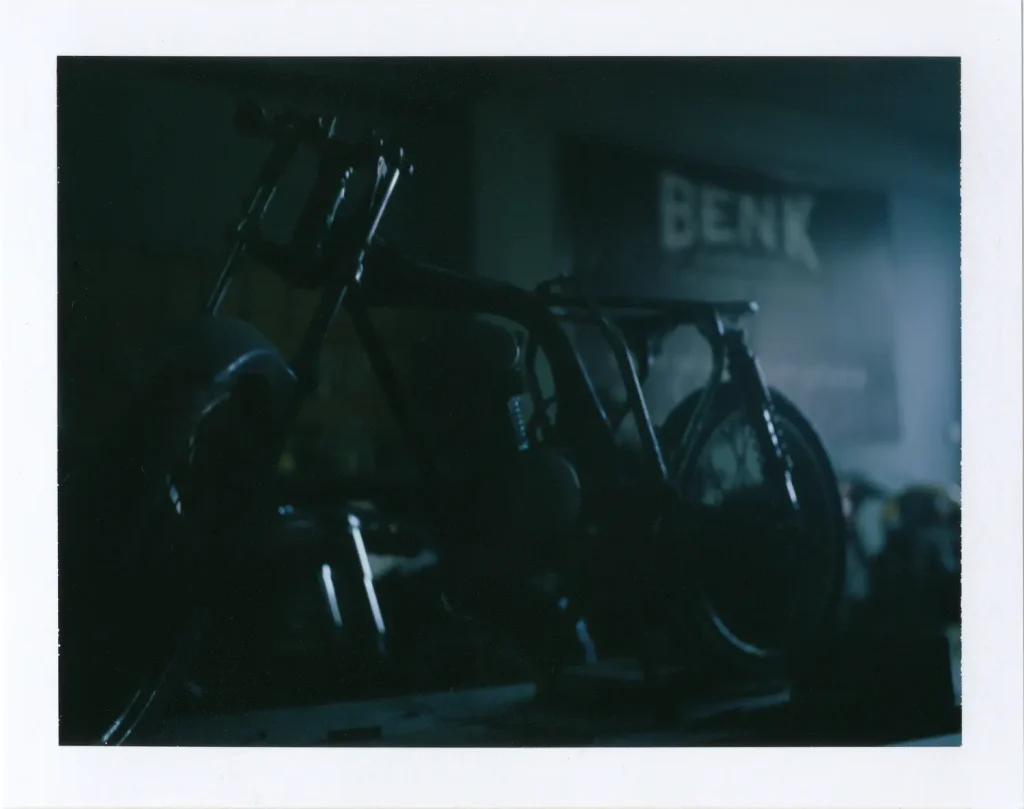
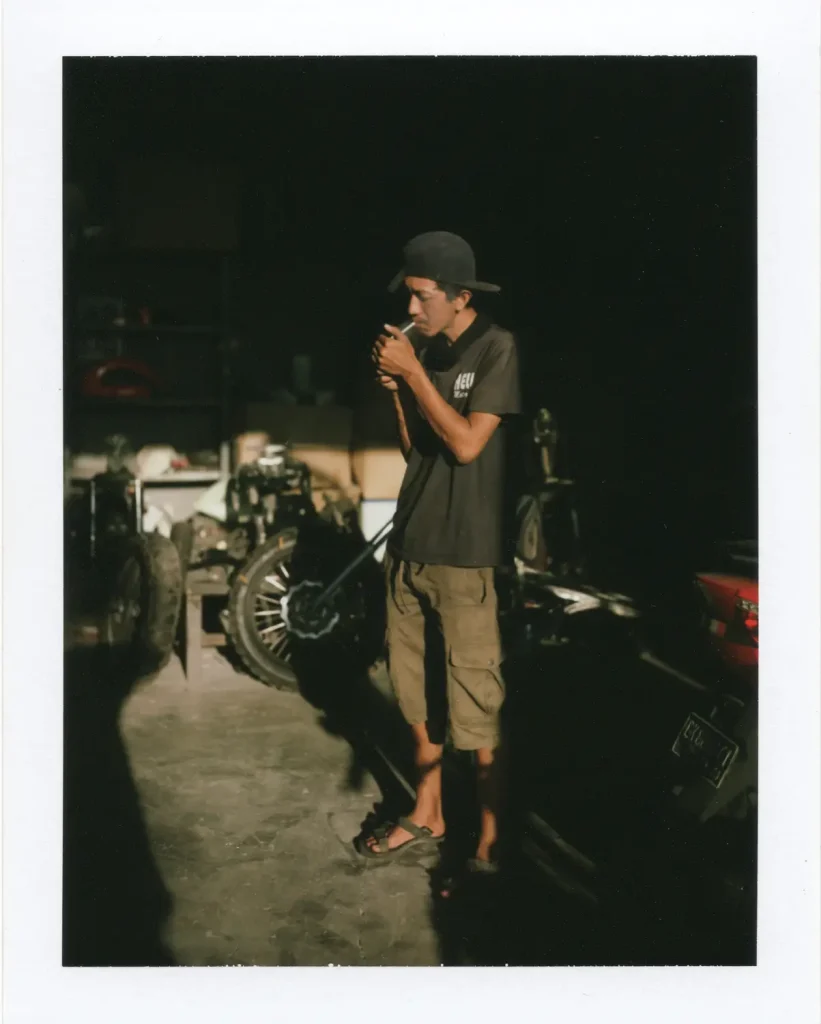
Enginegreak MC garage
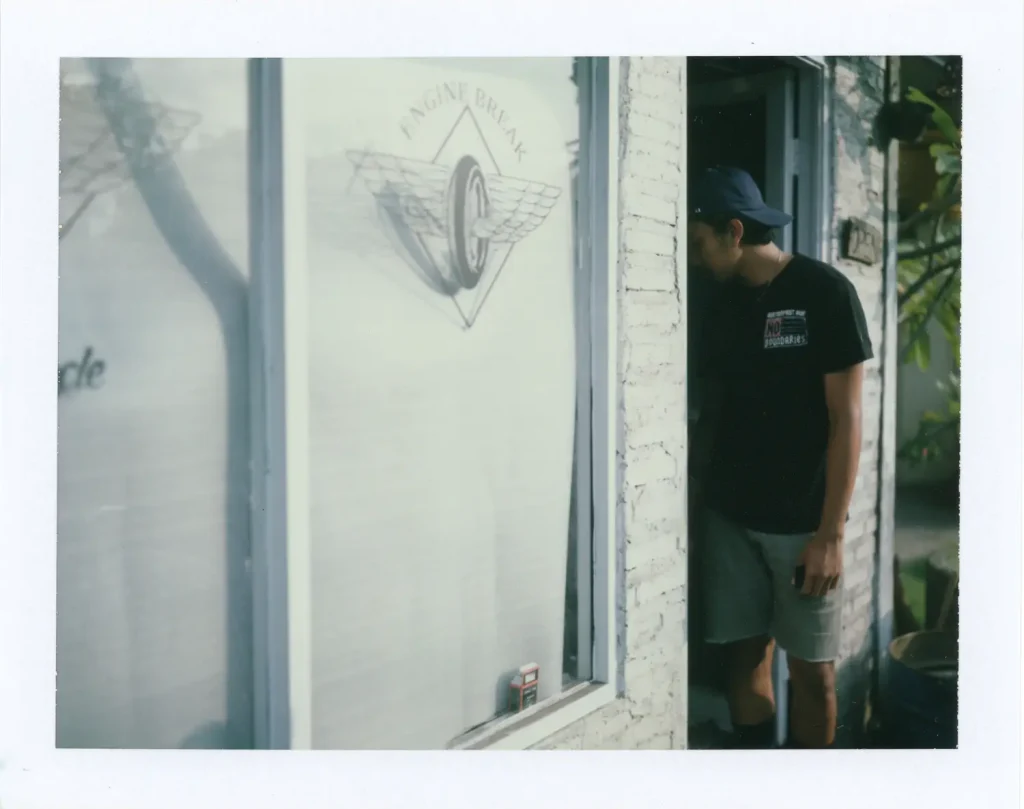
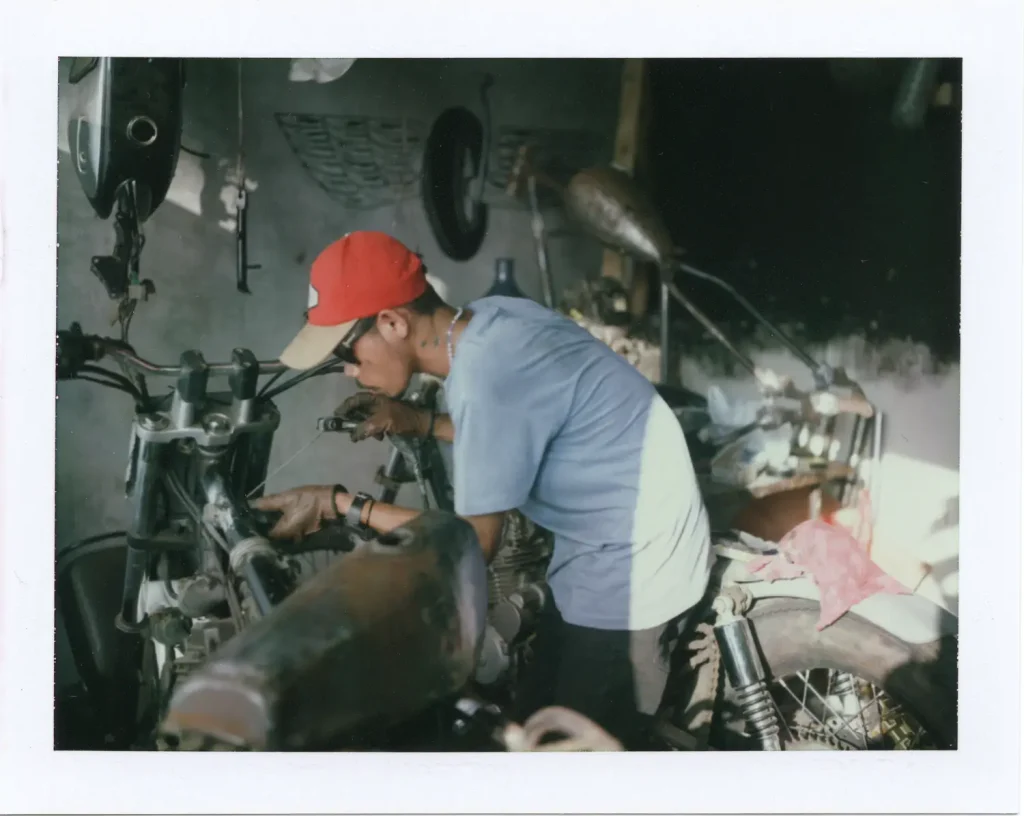
Polaracer is born
So printed down few business cards, which I hoped would give the project some “respectability”, as well as some self-confidence. Equally I signed up for instagram – @polaracer – and developed a website (where not much is happening) www.polaracer.com. The project’s name is derived from POLAroids and cafeRACERS; I liked its resemblance with polarizer.
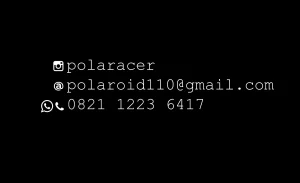
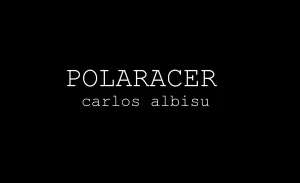
Modus operandi
I visit garages that I have either spotted on the street or found in the Internet. I show up unannounced at the garage and talk with the owner or whoever is in charge at the time. Sometimes the person I will talk does not know any English, then with my basic Indonesian I will explain what the project is about, “documenting the Balinese custom motorcycle scene, and putting it together in a book and possibly couple of exhibitions”.
Usually I linger around before shooting, but sometimes I cannot control myself and immediately produce the Polaroid 195 and shoot. There is no ice-breaker as good as instant film. When you peel apart the picture, and if you have managed to produce a decent one, everything changes, they will instantly cooperate with you, and often ask for the Polaroid shot. I have slowly learnt that people are not too keen to interviews so it’s better if I do it in a casual way, the less formal the better.
I do not have yet a clear idea on how to set the narrative of the future book. Sometimes I do want to instil a deep documentary style, others a light one. I usually visit the same garage several times, until I get enough pictures and the interview. Small garages are always very welcome and open, with my clownish style I quickly connect with them and I have tons of fun. With big garages there is a more formal and corporate approach and I have to control myself, still, I have worked within big corporations and I can act as expected…
Shooting the people
I usually observe and either reenact a scene or freeze it. So it usually goes like this, I am at the garage chatting or observing when I suddenly “see” the photograph passing in front of my eyes, I will ask the person to please “freeze” or to repeat a certain gesture or position, then I grab the camera, measure the light and take the shot. If there is a pattern on what I what I want to shoot I can patiently wait and then shoot at the right time.
In the picture below the bike was being cleaned for the shot, I liked to include the person in the shot, so I asked him to reposition himself as he was 1 minute ago
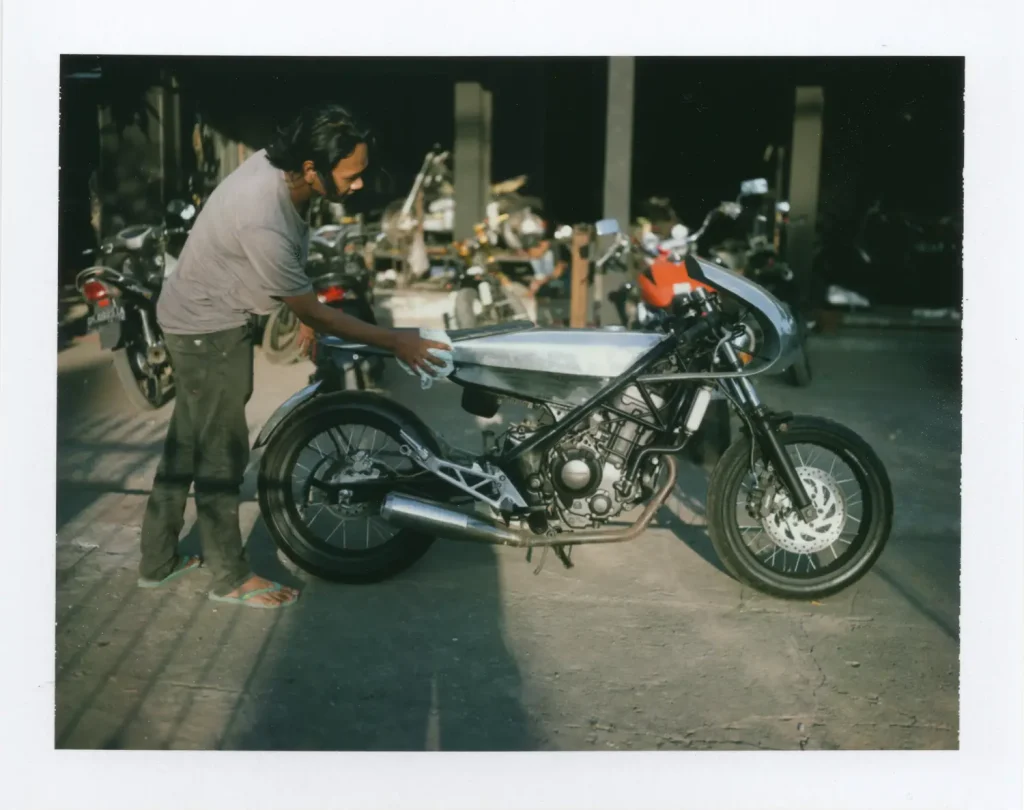
When taking portraits I try thinking what the person wants and what kind of person I am shooting. Sometimes I direct them to sit in a particular way, grab something, look here or there, and some other times I just tell them to please just stay still. Some people just pose by themselves. Balinese are pretty cool when being photographed.
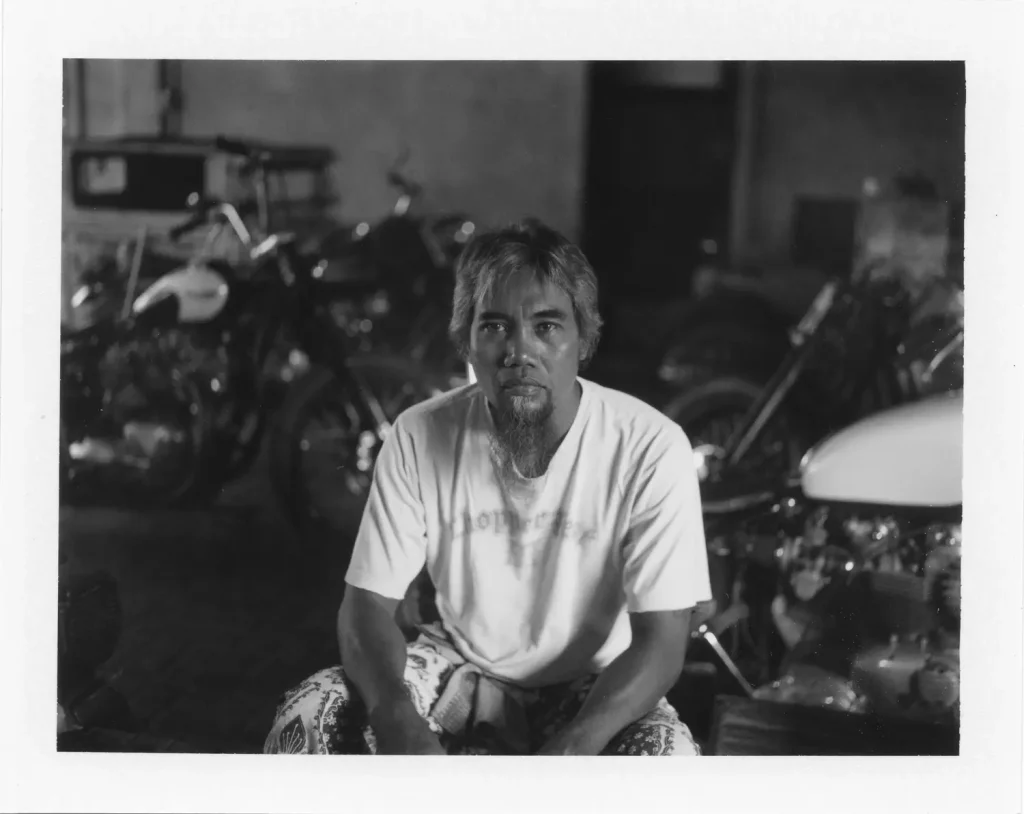
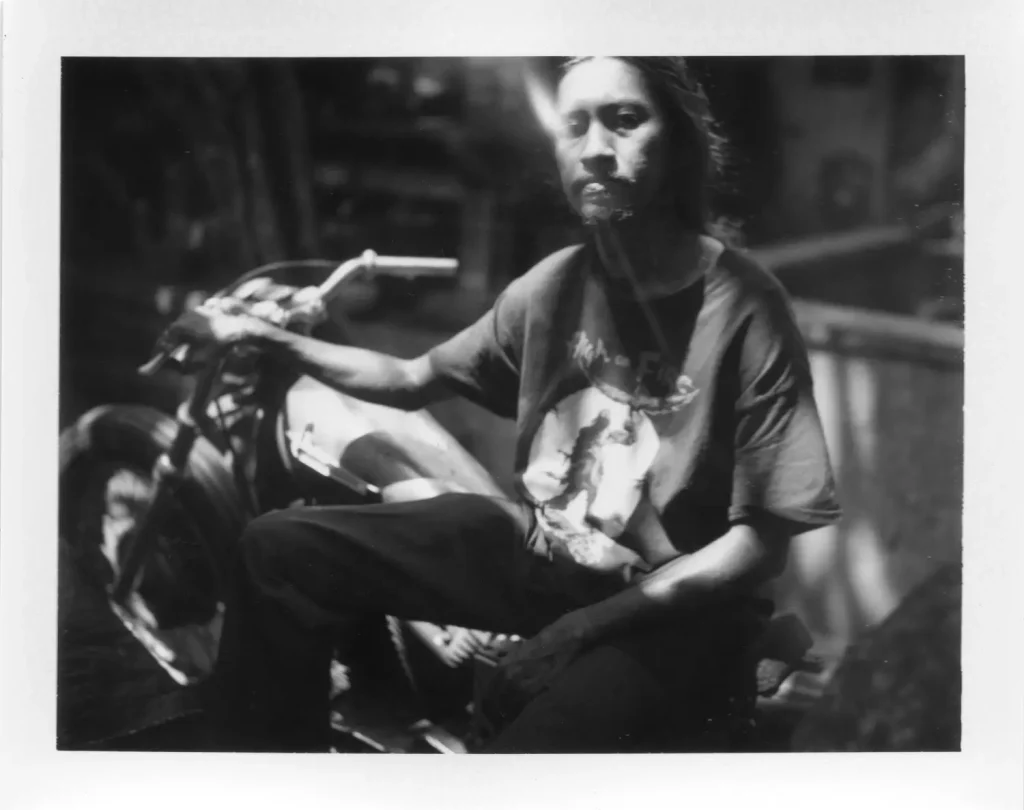
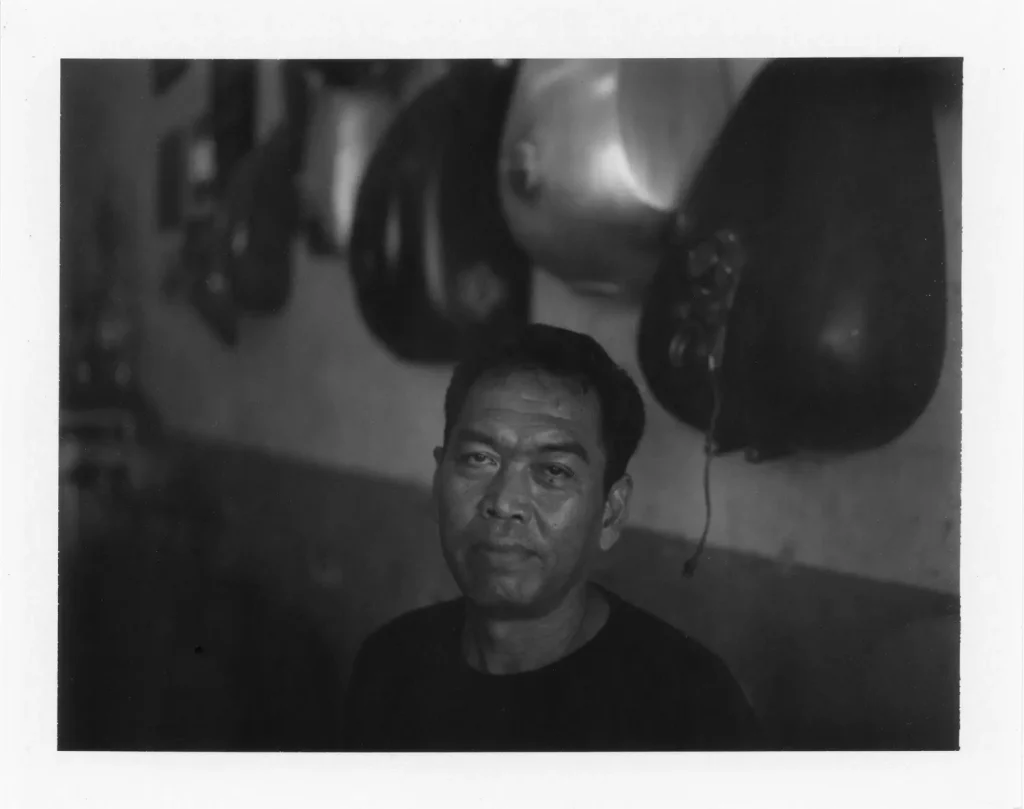
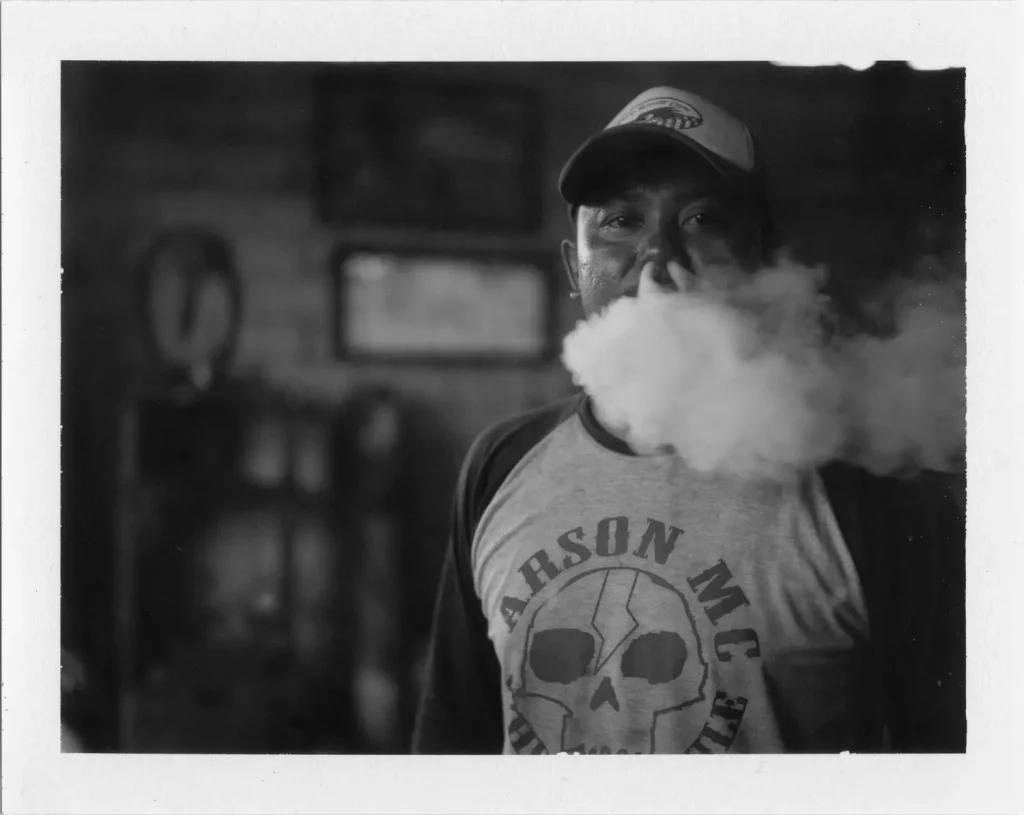
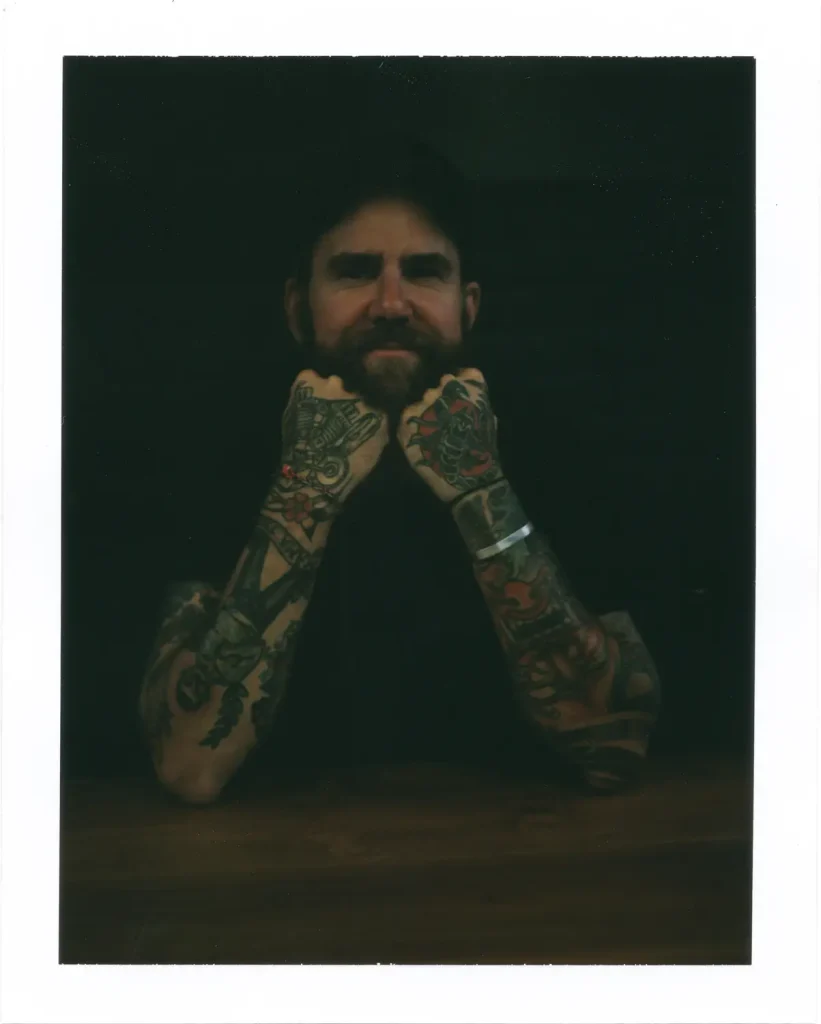
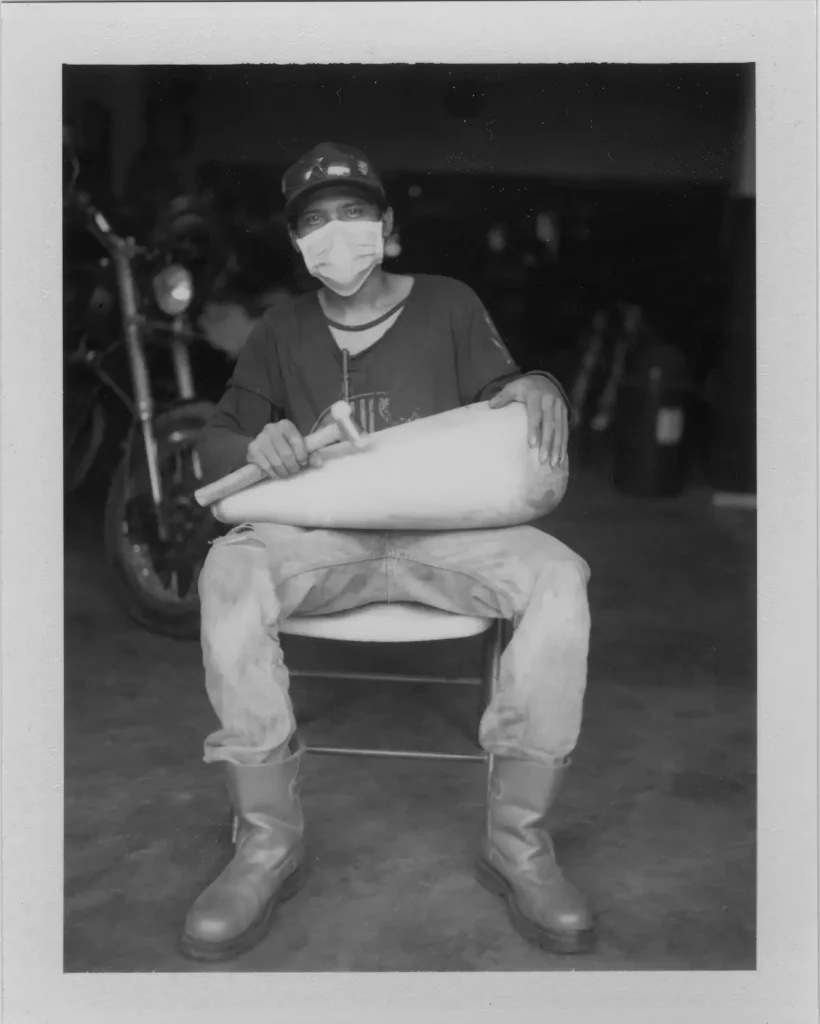
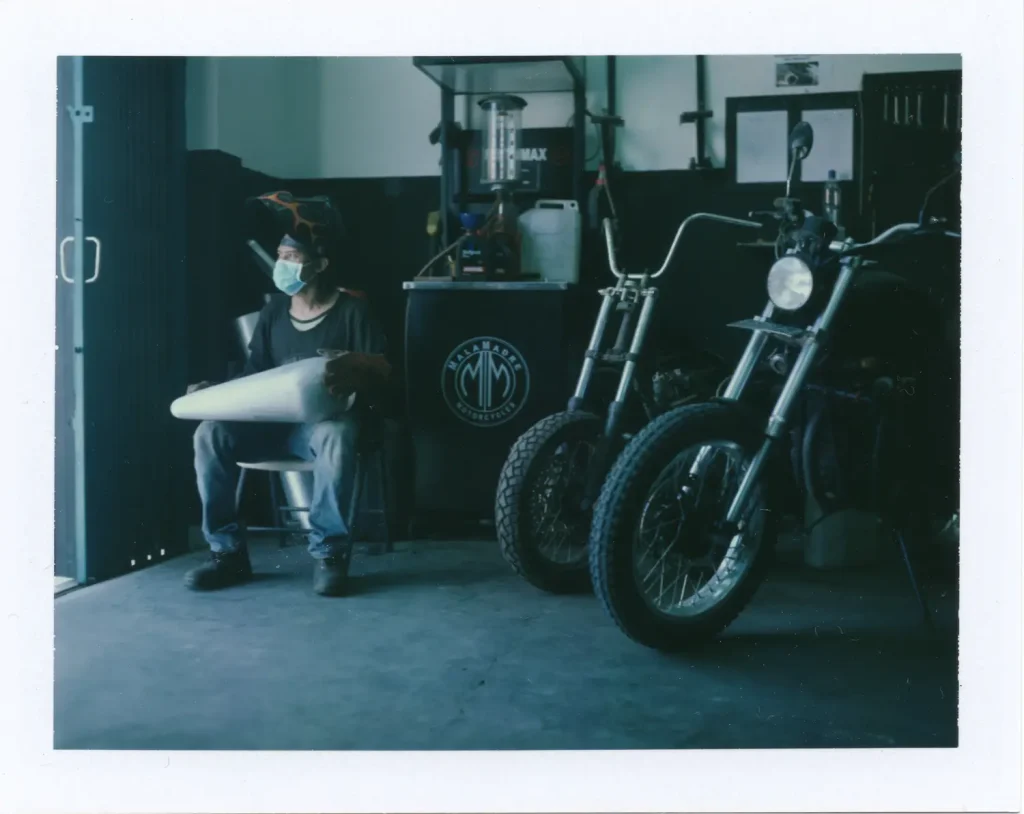
Kudex the garage owner, and one of the most renowned artisans told him he did not like his first shot – in truth I was not convinced by it either. I appreciated his comment and made my best for a second shot attempt.
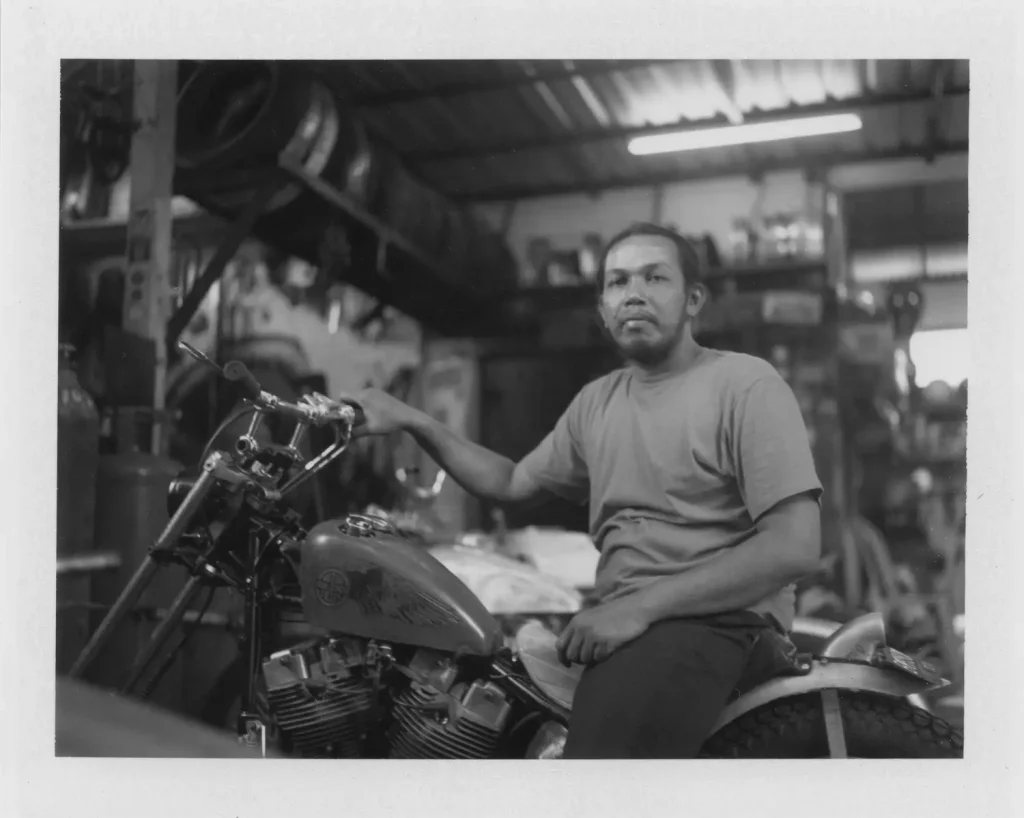
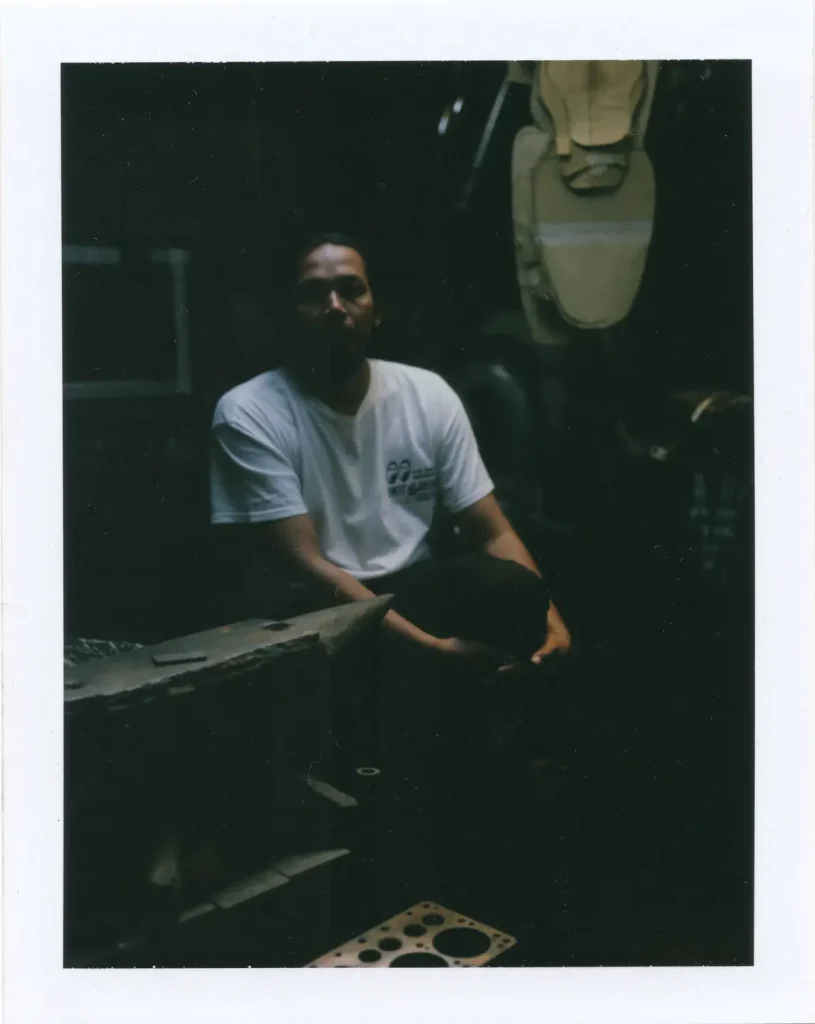
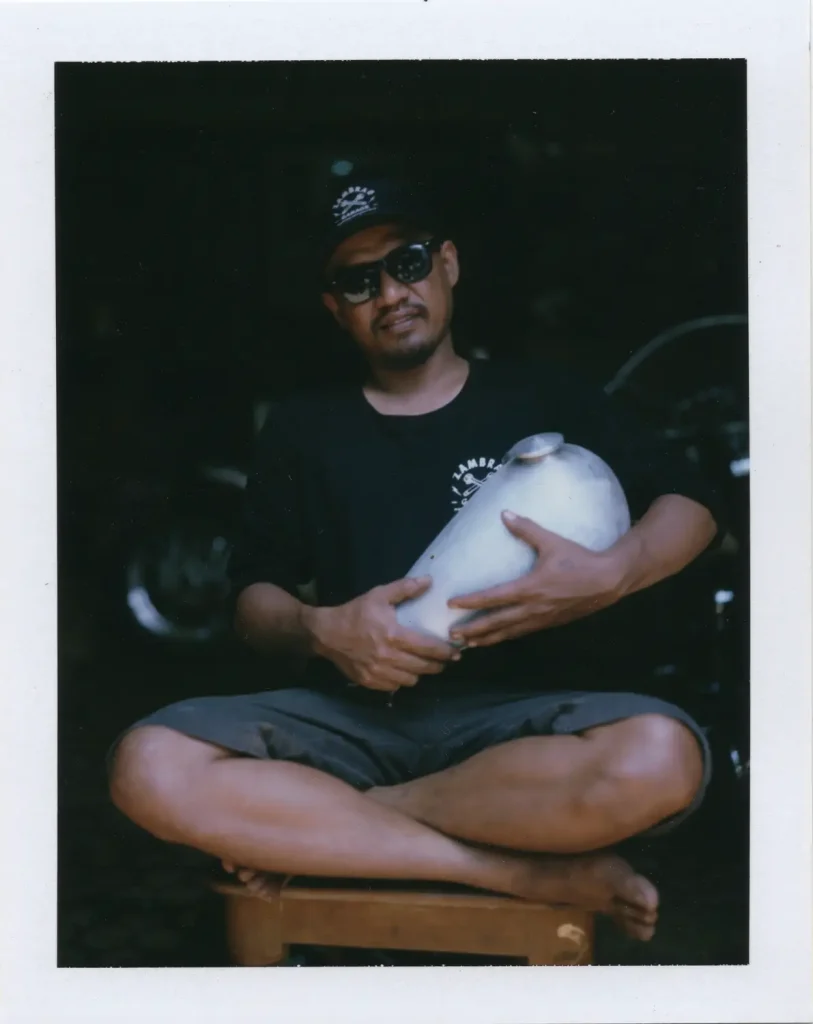
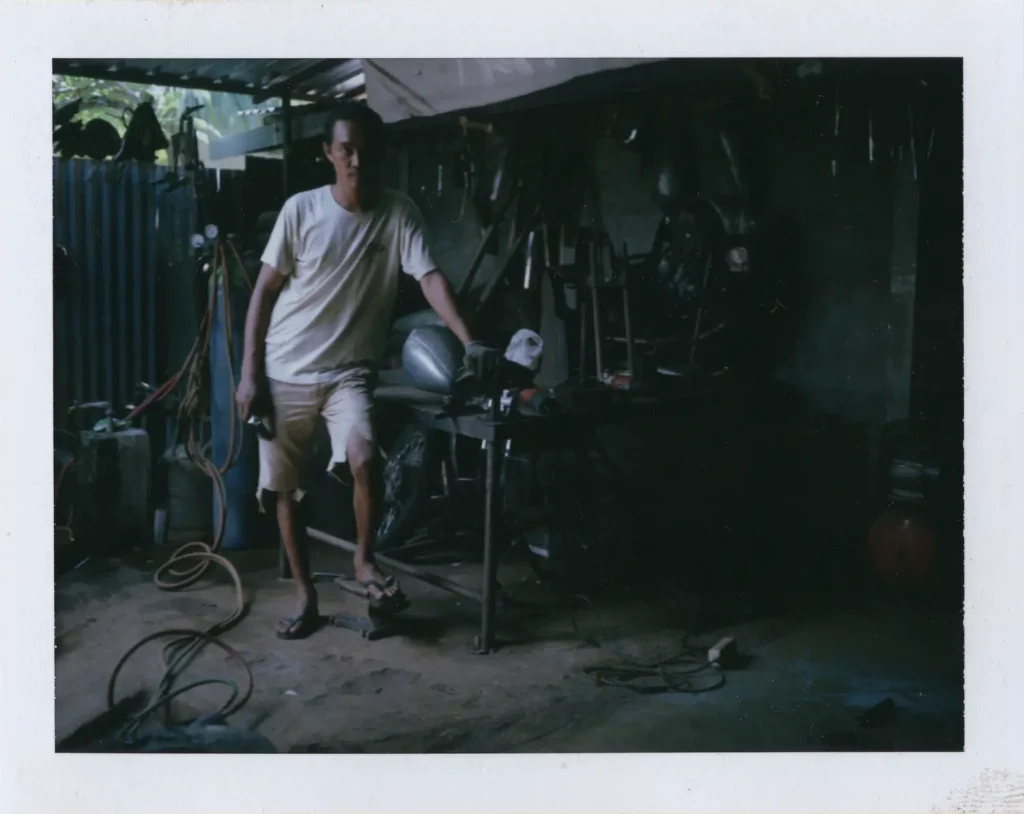
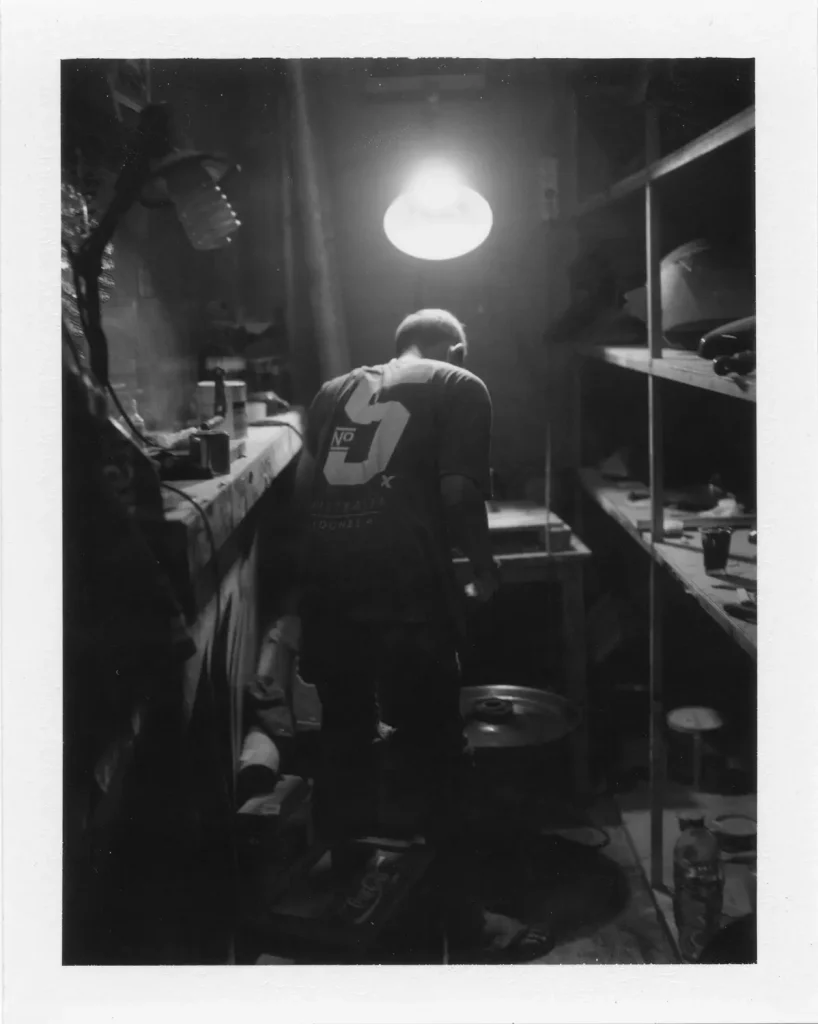
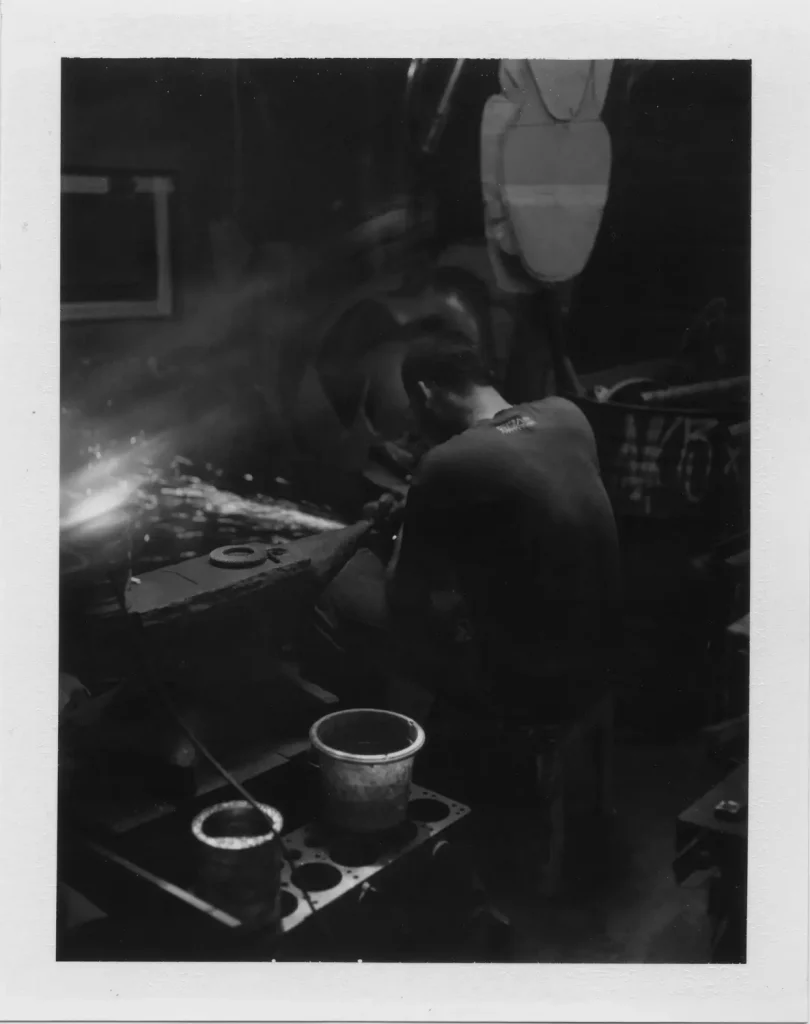
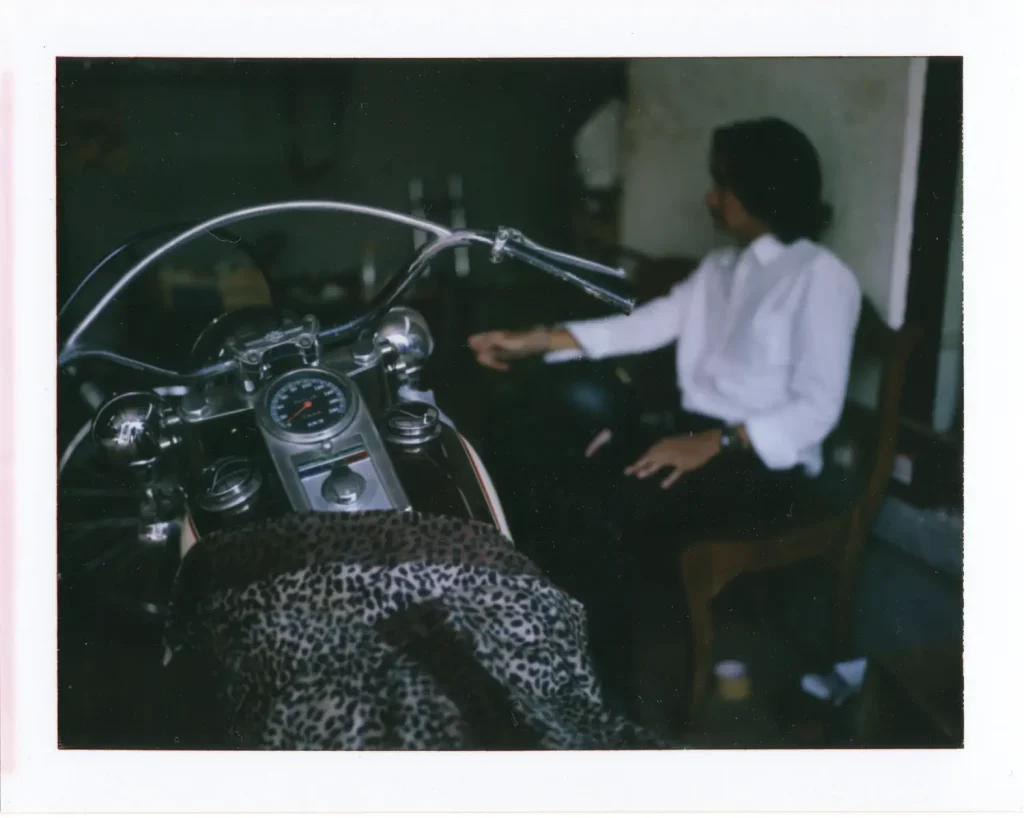
Shooting the bikes
As you probably have observed there are not that many bikes in the pictures. Lately, I have been focusing more on the bikes. As I hinted before I am not that keen on shooting objects, I am much more attracted to shooting people, and I guess that through practice I have become more proficient at it. Reckoning my limitations I usually shoot the bike together with a person, and rarely by itself, still from time to time I shoot just bikes…
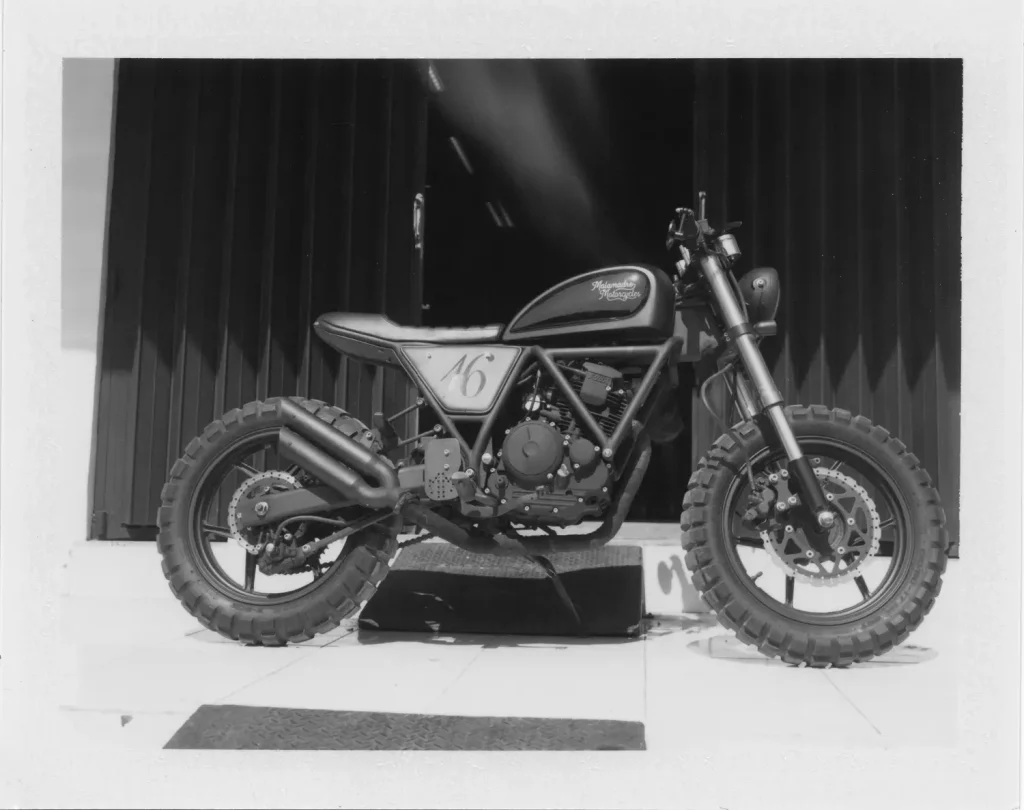
I always struggle to imprint life to an object. On the other hand I am not a big-shot photographer so I shoot what’s around me. Sometimes I move things so the background of what I am shooting at is more pleasant, or I put a bike here or there. Usually garages are cluttered with lots of things, and sometimes I feel like I would like to shoot outdoors, with bikes on the move.
This was shot at 1/4 or 1/8, leaning the camera on an object nearby. The shot was too dark so I bleached it. Doing so you can recover 1 or 2 steps of light.
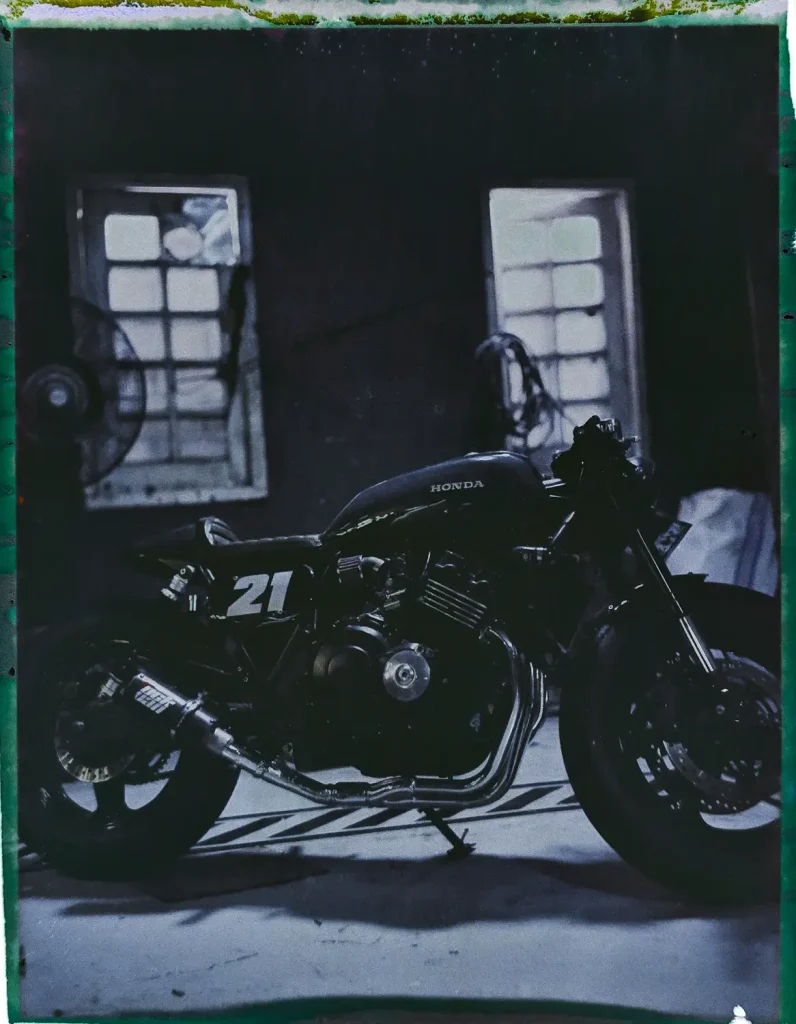
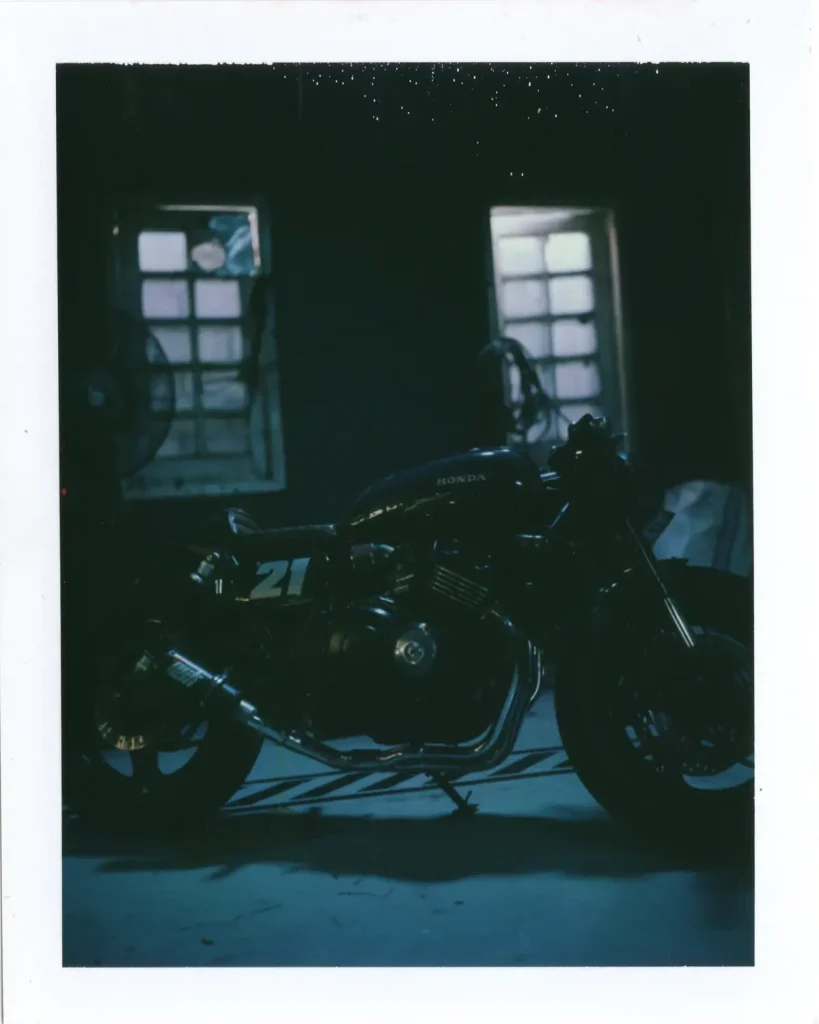
Most of the early Harleys came from surpluss at the Army. The American, Dutch and British troops left lots of military material after the WW2 when Indonesia became independent (1945). In 1965 the Indonesian army gave away its aged material, as I was told by Pak Lolot, a former member of Armada Racun group, who acquired many Harleys from the army. This is why there are also many Triumphs in Indonesia.
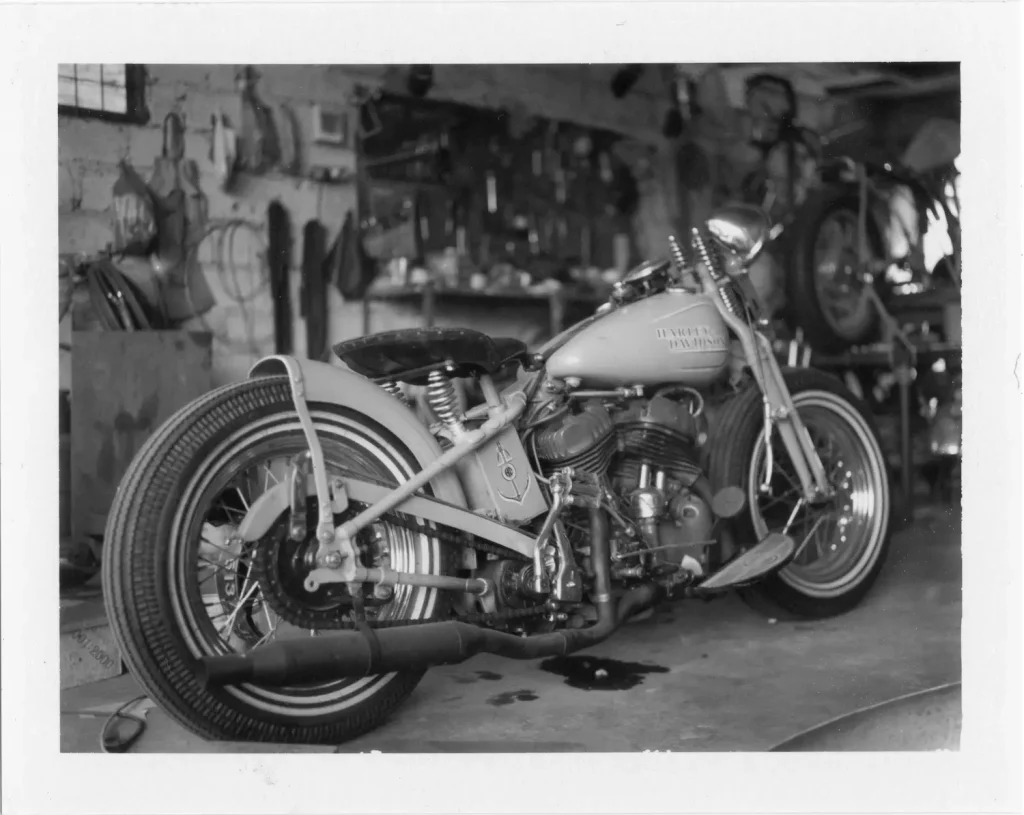
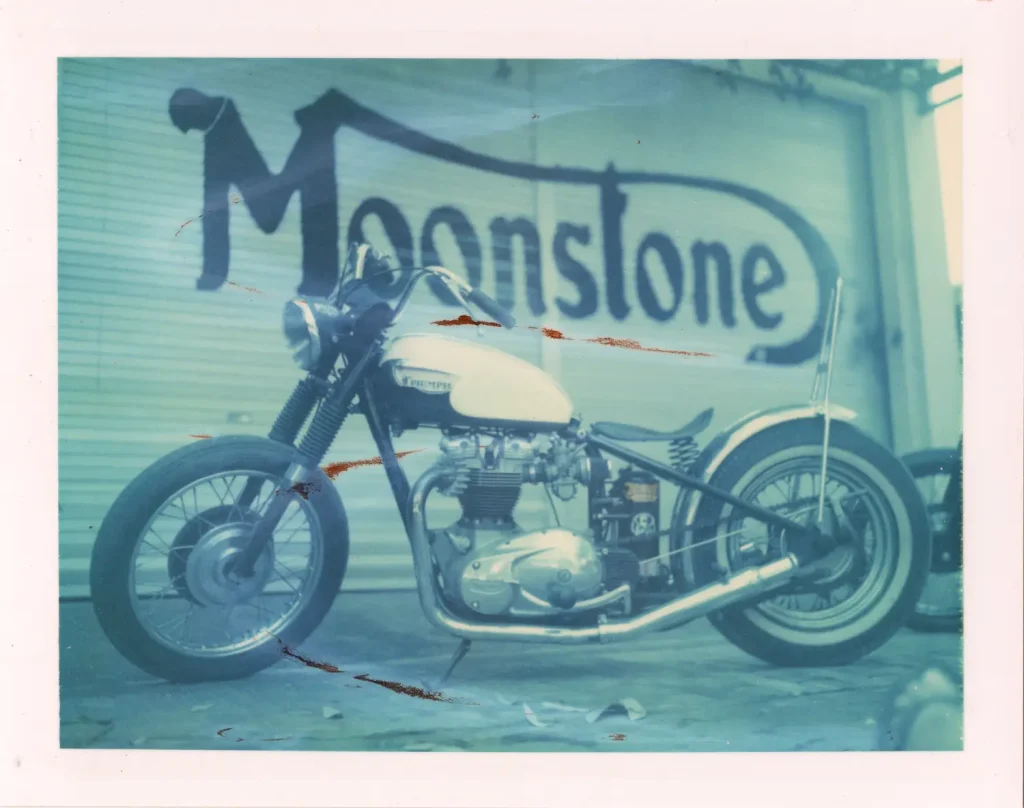
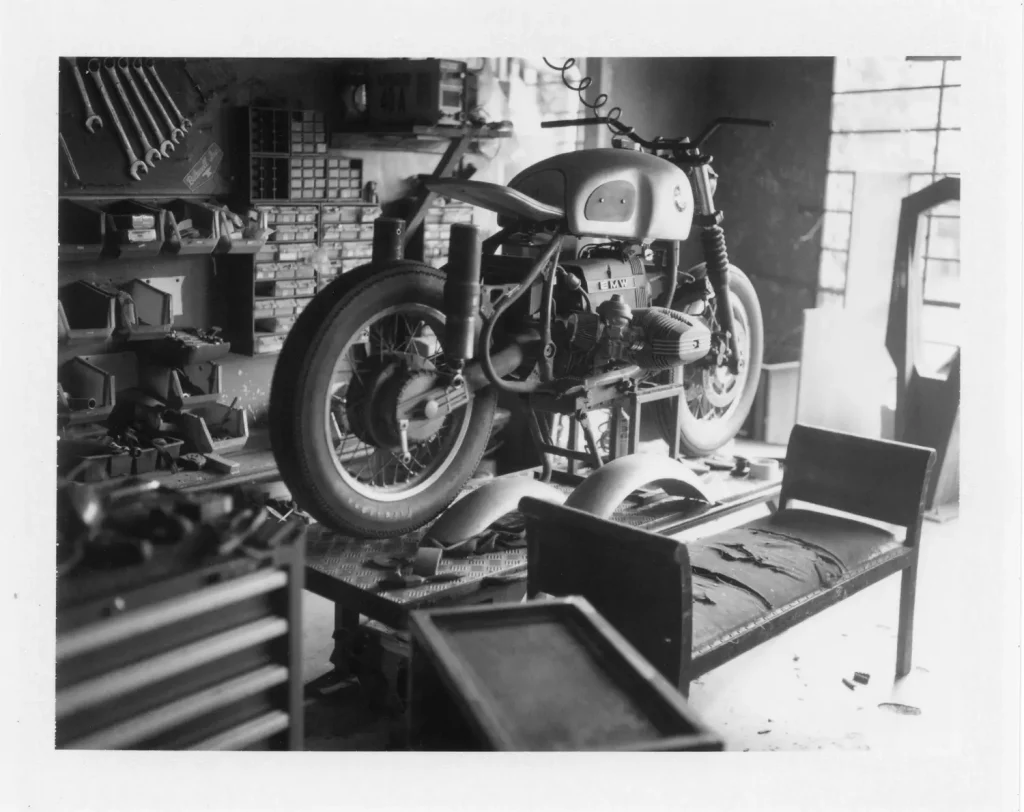
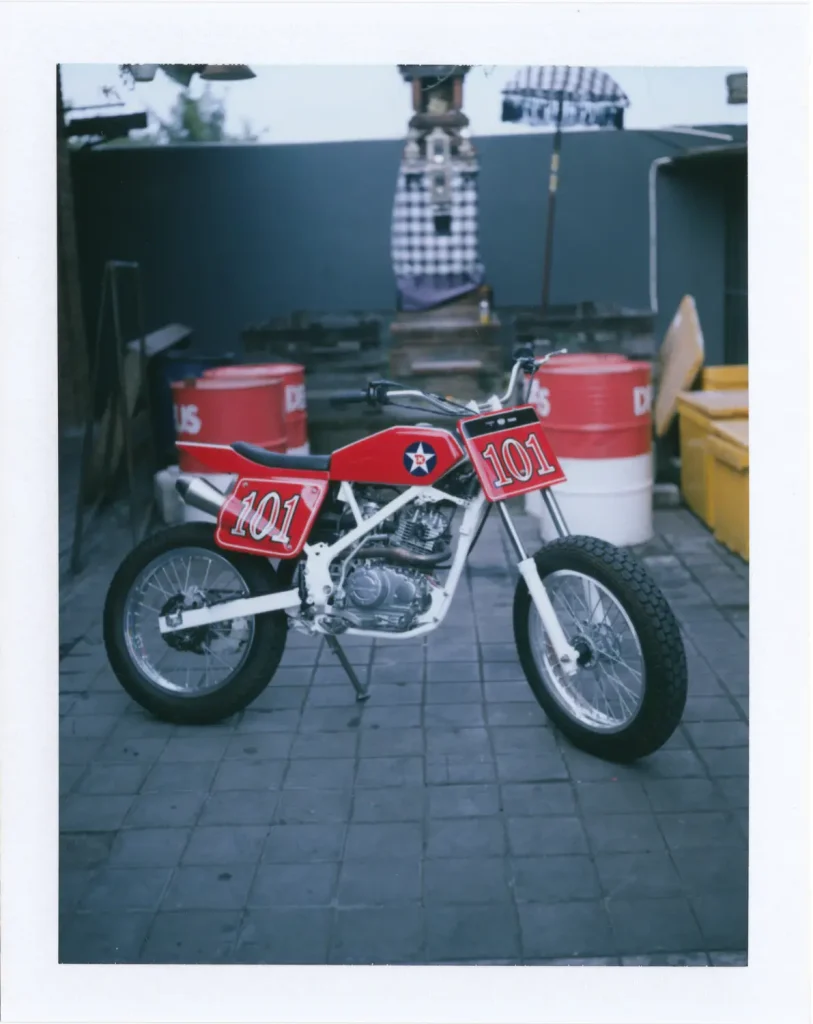
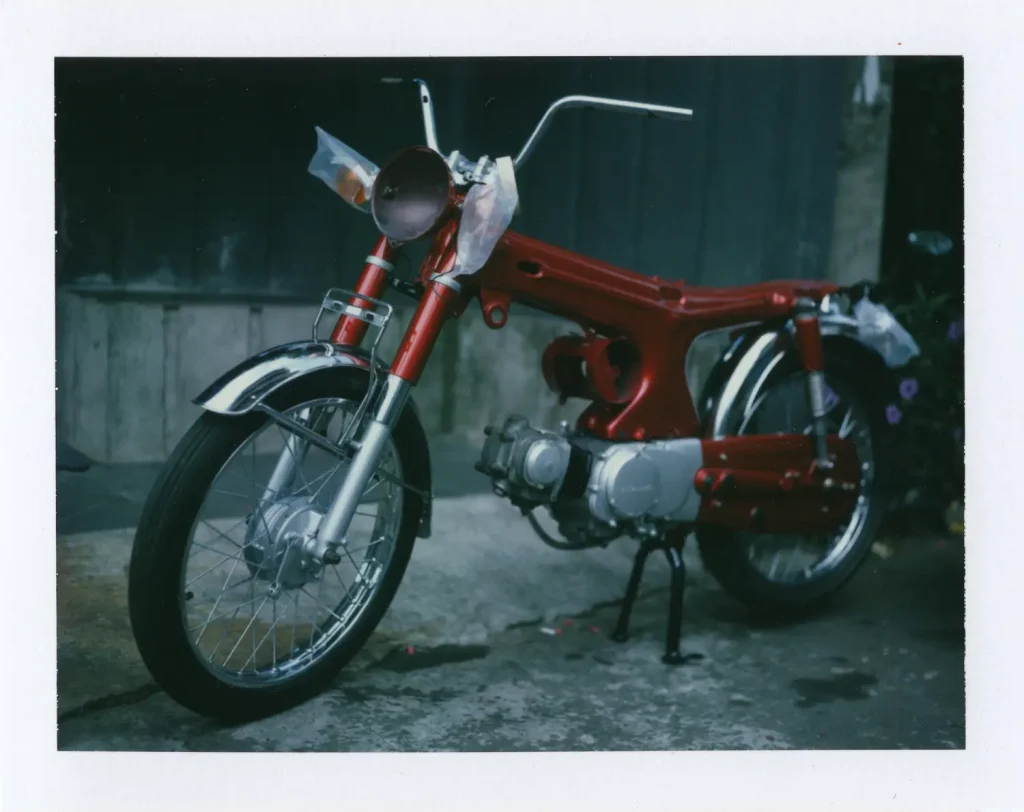
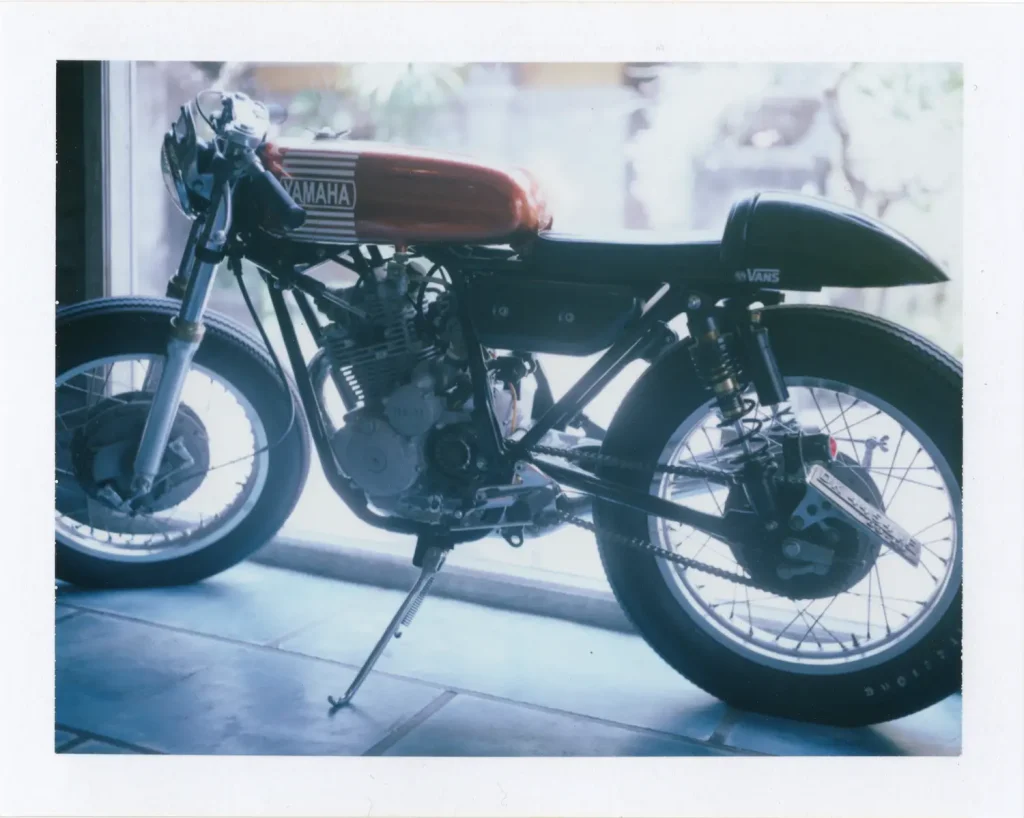
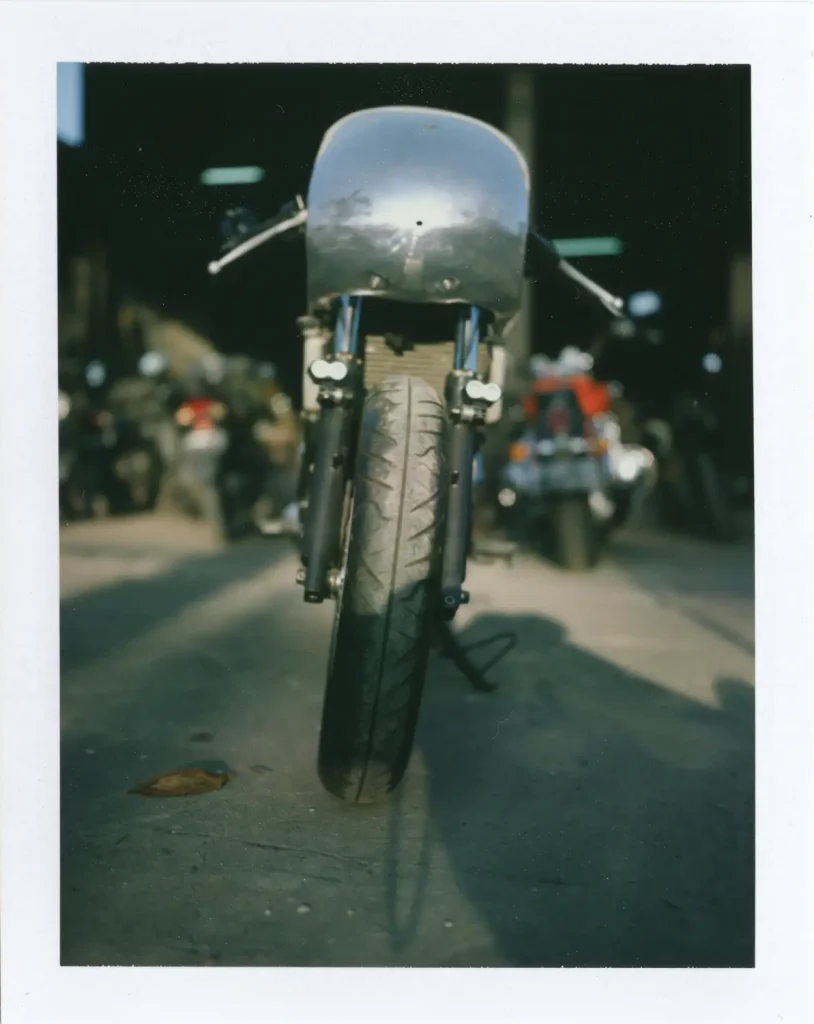
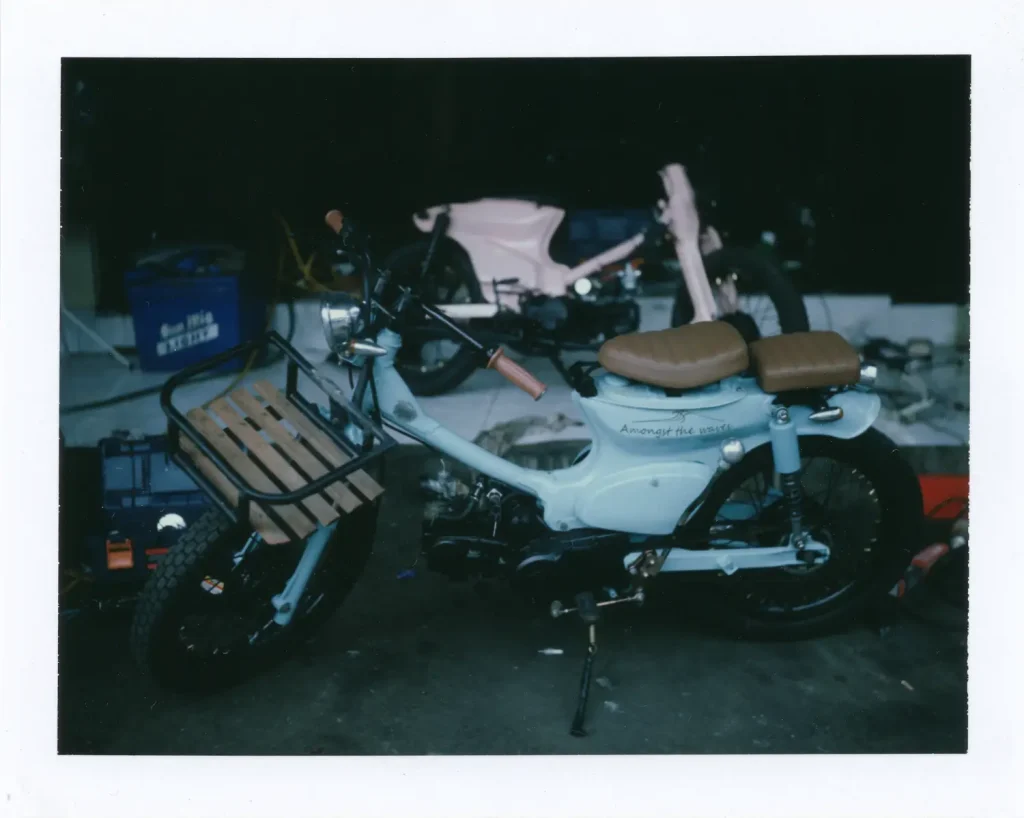
The advantages of a project
In my very personal opinion, being a non-professional photographer basically allows the photographer to have no specific goal when shooting – ok, I just reread the sentence and sounds bad. I am sure this is not the case with many non-professional photographers, but it was my case; sure I tried few projects, and throughout time I have developed a style and preferences when shooting, but I wonder how much of what I shot at was dictated by the lack of a project. Now that I have a project I nonetheless see similarities with what I used to shoot at, so I might be over-stressing the importance of a project. I like to photograph people, I like to interact with them, so no wonder that even though the book is about motorcycles I am still attracted to people and feel at ease photographing them. As I once heard, it is more about the people behind the motorcycles than the machines themselves.
One clear side effect of having a project is that I shoot regularly and my urge to shoot is fulfilled, therefore I do not roam the streets looking for shots, which means less street photography. This might be good, it might be not, I like them both. Ok, I do still love street photography! But the side effect is clear, I recently went to Singapore for a long weekend and sure I brought the Contax G1 with me, but then I did not leave the hotel in the first hours of the morning as I have done in many other occasions…
Shooting with a Land Camera
The Polaroid 195 is a fully manual camera, where you can control speed and aperture, no more, no less. It is a very distinctive camera that heavily influences how I shoot, regardless of using instant film. I consider it a hybrid between a medium and large format camera. I always shoot it handheld, sometimes down to 1/15 due to the slow film I use and the prevalent low light conditions. I have “recovered” couple of underexposed shots by bleaching the Polaroid goop, but I rarely do so; I prefer to present the original shot, which I seldom edit. Sometimes I add or subtract some little light. I hate tripods, they turn everything slow, I cannot move around. Now I am getting used to lean the camera on any surface, such as a handlebar, and shoot. Recently I managed to shoot as slow as 1/4 and the shoot came out decent!
Camera and the slow film enjoy many limitations, but not necessarily for the worst. For one thing they really shape your approach and the final result, therefore producing pictures that you would not have produced with different equipment, or even unexpected results. I really try my best to use the little available light in a creative way. All in all it has the potential to develop a distinctive signature.
Down a shot taken by expired Polaroid 108 (year 2000),
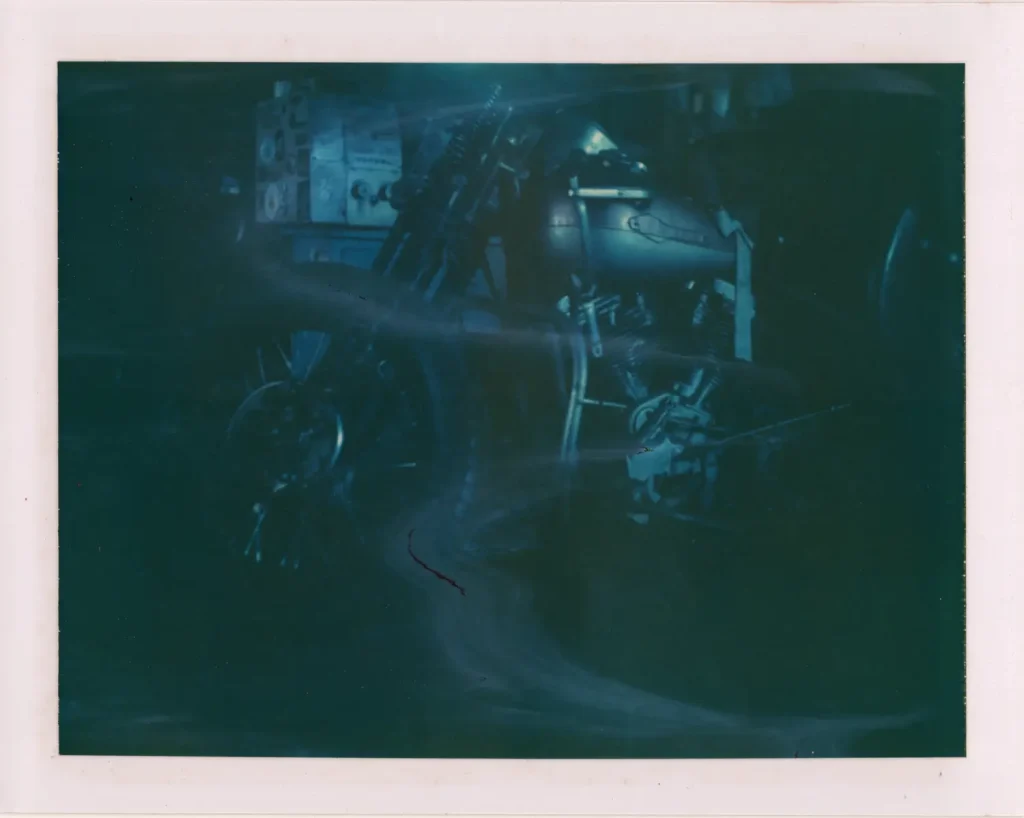
Shooting film in Bali
Shooting 35mm color film in Bali is doable. You can go to many little photography shops and they will bring the film to a big lab where it will be developed. The prints I got were overly saturated and too bright, the scans the same, they do not look like they were shot with Portra or with the Contax – instead, they have a particular 70s look.
A couple of shots with the Contax G1, scanned from printed photos:
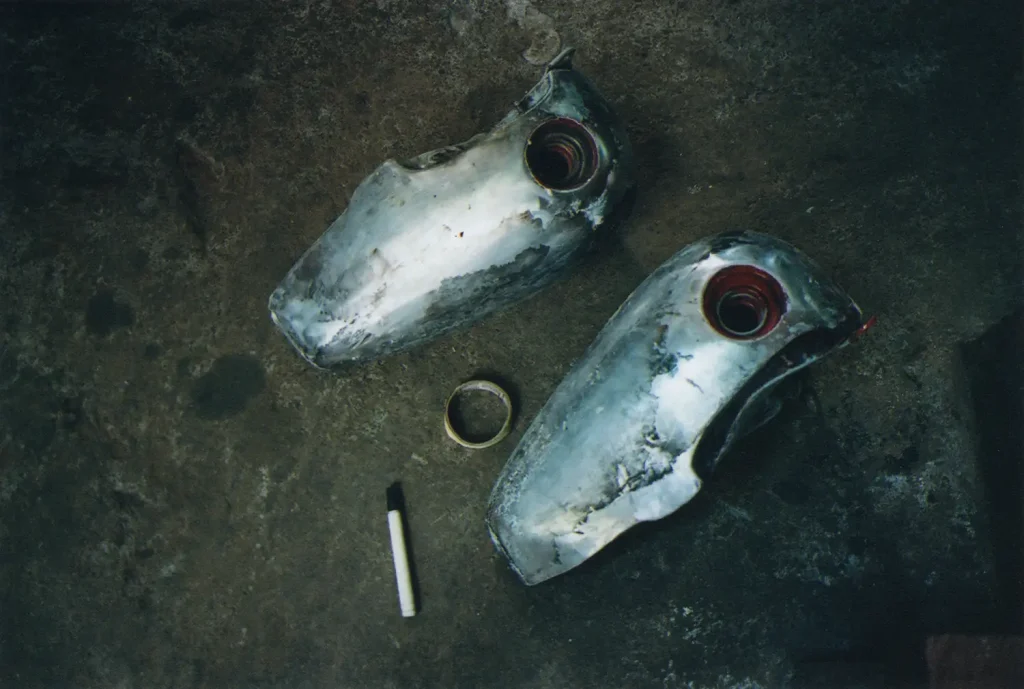
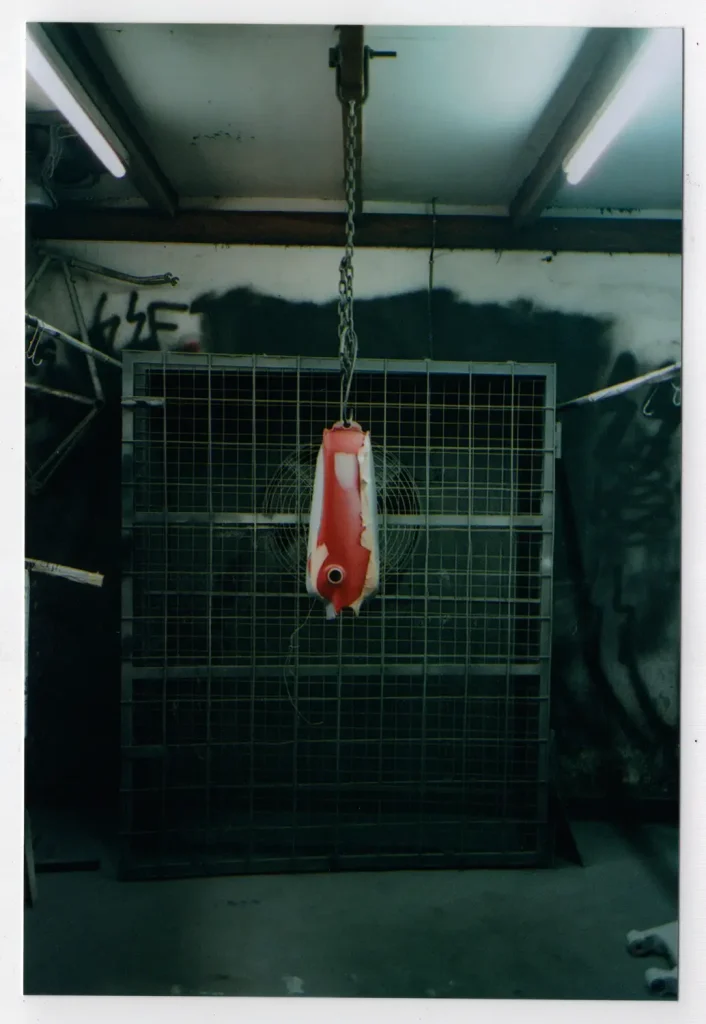
Luckily I mainly shoot Polaroid. Having all my equipment at home I was able to buy a modest Epson V39 scanner in Bali, it does the job. I also scan the bleached negatives of the Fuji FP100b and Fuji FP100c. The 100b is complicated and results so, so, things might change with a scanner able to go through negatives. Meanwhile I scan bleached Fuji FP100c by using the iPad as a light box and then shoot at them with the mobile with a contraption I made.
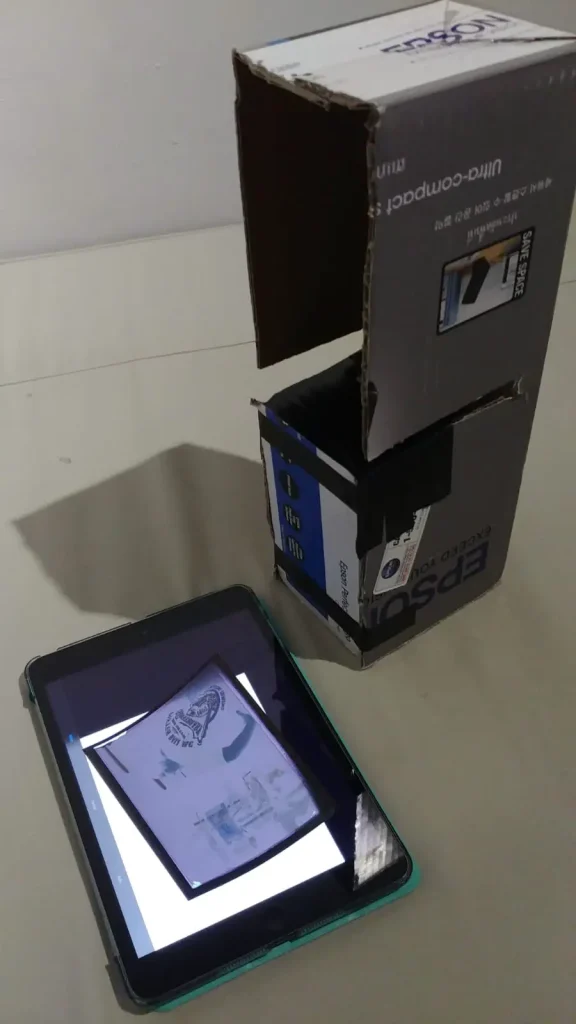
Some considerations when shooting Polaroid film
Shooting Polaroid film is messy. When you peel apart the film you have two sticky elements, the Polaroid picture and the Goop. I will usually put them inside little boxes, the original film cartridges, but then if you shoot several times it gets more complex; you have to be careful to store the boxes horizontally, because if not the goop or pictures might stick to the walls of the box. Of course when you already have a over stuffed backpack things get confused, sometimes embarrassing.
One solution is to extract the shot from the camera and not peel it apart until back at home; developing time is a minimal, not a maximum, so the picture will not be overdeveloped, but if you leave the picture unpeeled for few hours the shot will be somehow damp. This is no problem with fp100c, but with fp100b it might happen that some goop adheres to the picture, which can be solved by rinsing.
Scanning on the go
One advantage of owning a light flatbed scanner is that it easily fits in my backpack, so when packed together with the laptop allows me to scan old pictures and designs of custom bikes, as the ones below, on the go. Drawings are not very popular, either because the builder lacks the drawing skills, or because they are expensive. Nowadays designs, when done, are done through computers. Big garages usually do so.
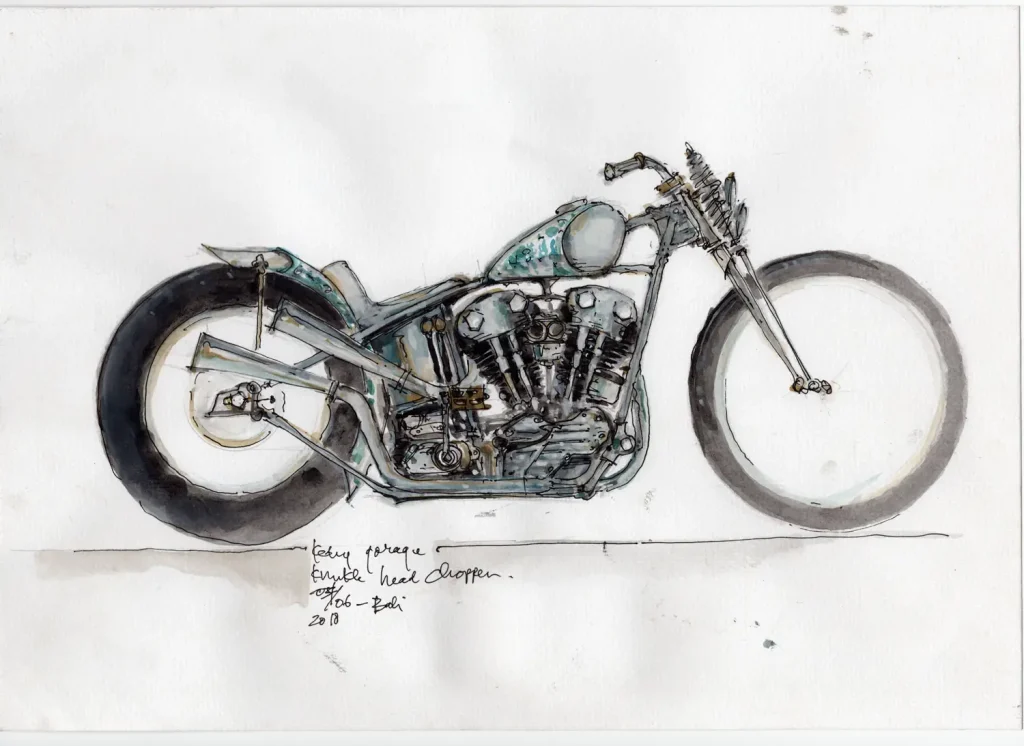
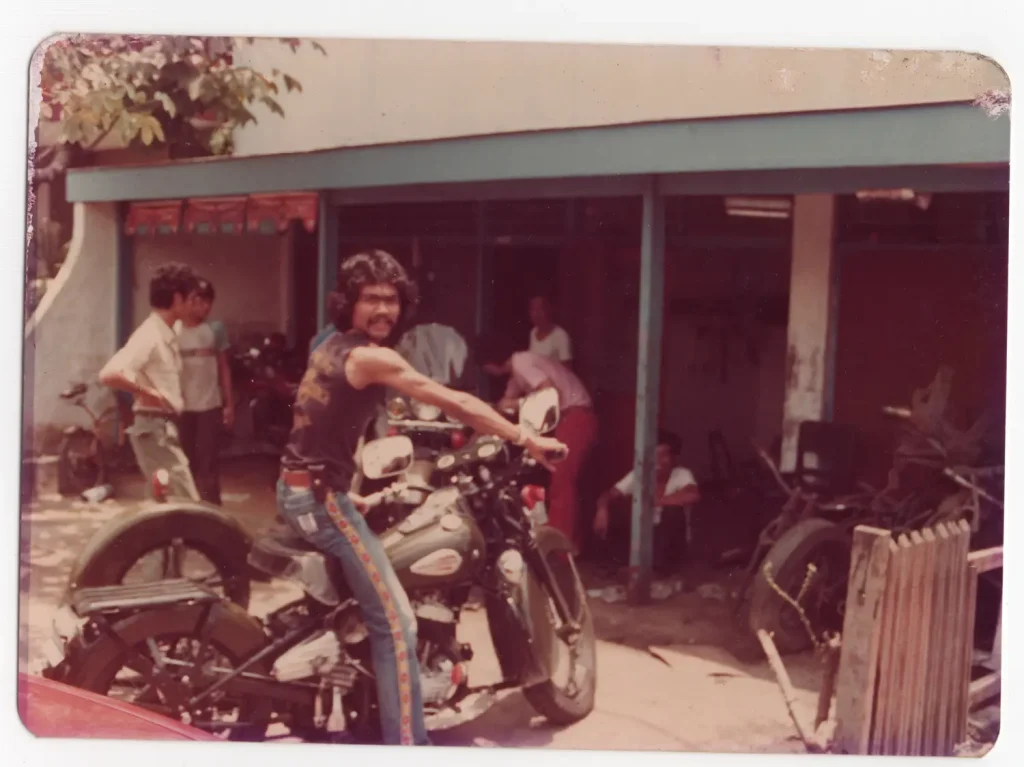
The project so far, and what is needed
So far I have visited around 12 workshops, a number that at the beginning I thought would be close to the total number of custom motorcycle workshops in Bali; but I have realized the total number might be closer to around 20. Not counting the myriad of tiny workshops. I have visited the most relevant ones, now it is a matter of revisiting them and producing more “quality” shots. I am intending to obtain around 6 shots from each garage. I need more interviews. I recently interviewed a former member of a motorcycle gang and it was quite a thing – I was given a bible and a Harley Davidson ring and we prayed for the book.
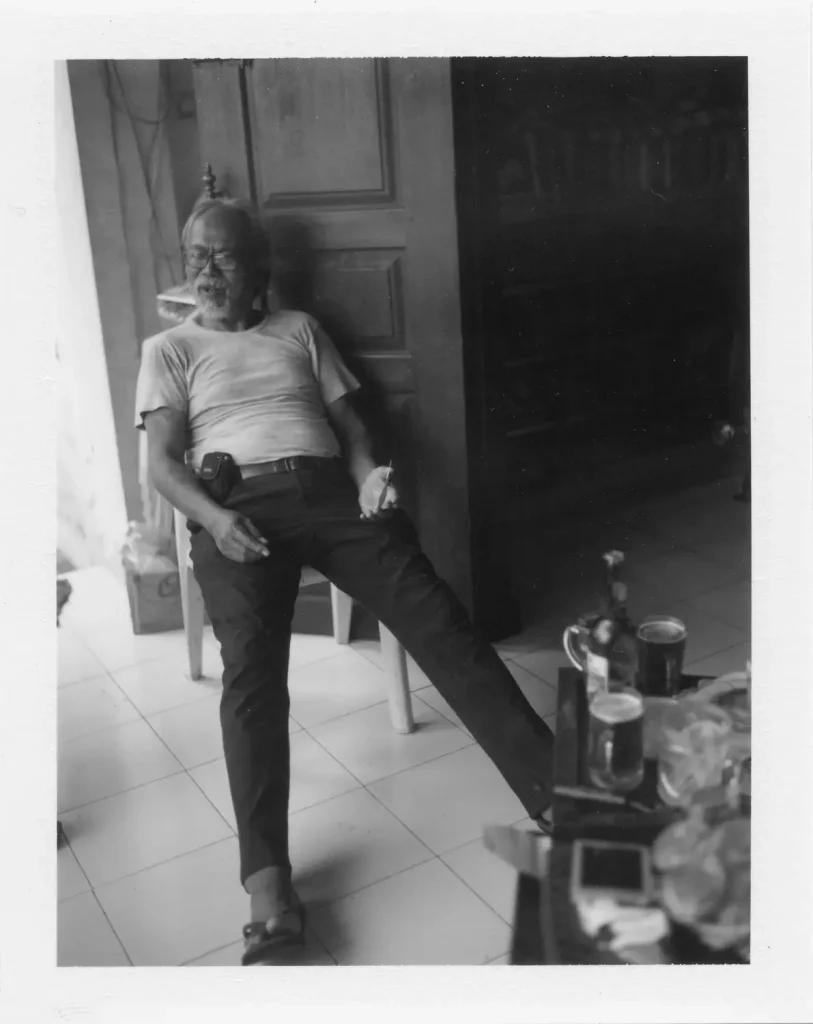
I really enjoy the interviews, I guess it’s a side effect of my previous job where I used to perform lots of interviews! Being a newbie to the motorcycle world it’s so interesting to hear about the impact of social media, the relevance of life style, the corporate accent and the risk of loosing the passion, and so on. Next comes designing the book, which I think I will also enjoy, hopefully a couple of exhibitions, and trying to promote the book…
Sure I have my ups and downs. I have already gone through the phase of asking myself why I am doing this project, for whom or if anybody will be interested? I think people working in the garages appreciate what I am doing. I believe that the fact that I am shooting manually, with such a slow approach and spending more of the time observing and admiring what they are doing rather than shooting – it makes a difference and somehow shortens the distance between of what I am doing and what they are doing.
As somebody mentioned to me, I was giving new vibes to the custom motorcycle scene, whatever that meant I take it as a compliment and encourages to keep shooting with my particular approach. Nonetheless there are occasions where I am not able to produce a catchy shot and I get really frustrated – or like the other day when I was shooting my last Fuji FP100c pack and the pack jammed inside the camera!! Oh my, I had to reopen the camera, reinsert the pack, rearrange the labels… I managed to shoot 4 times, which at the end was Ok. All in all it makes me keep shooting with a big smile and be willing to produce better shots.
Speaking of smiles…
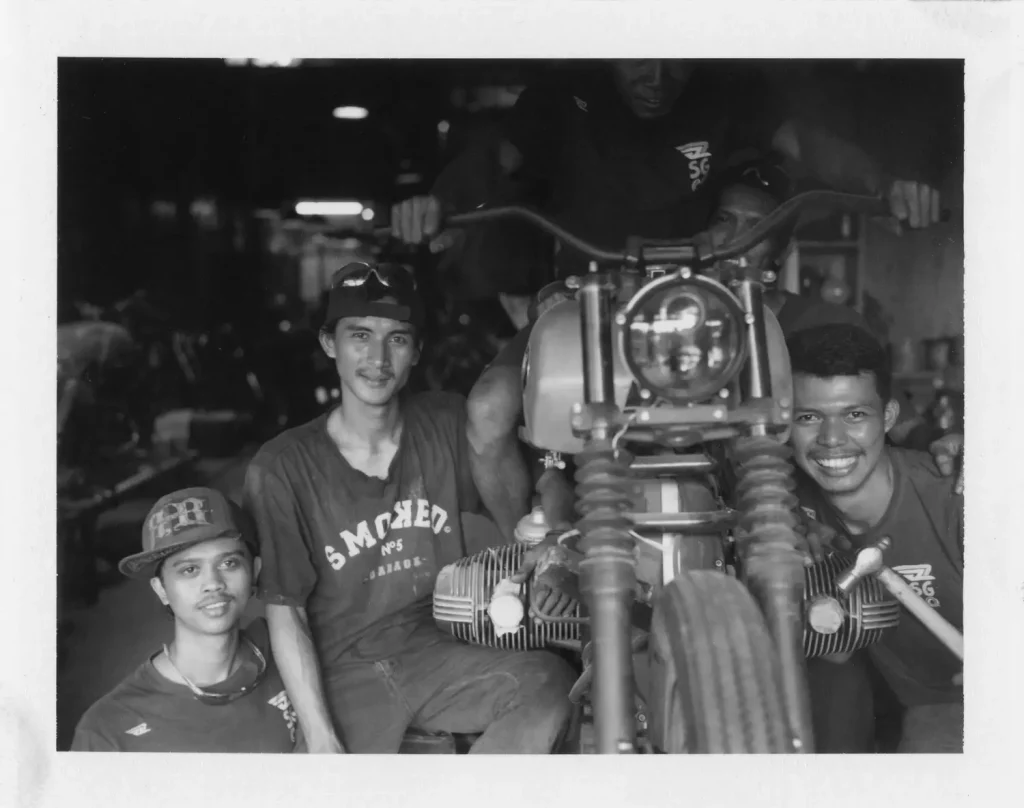
Thanks for being patient!
Carlos
Instagram: @polaracer
www.polaracer.com
Other content I have written for 35mmc here
Share this post:
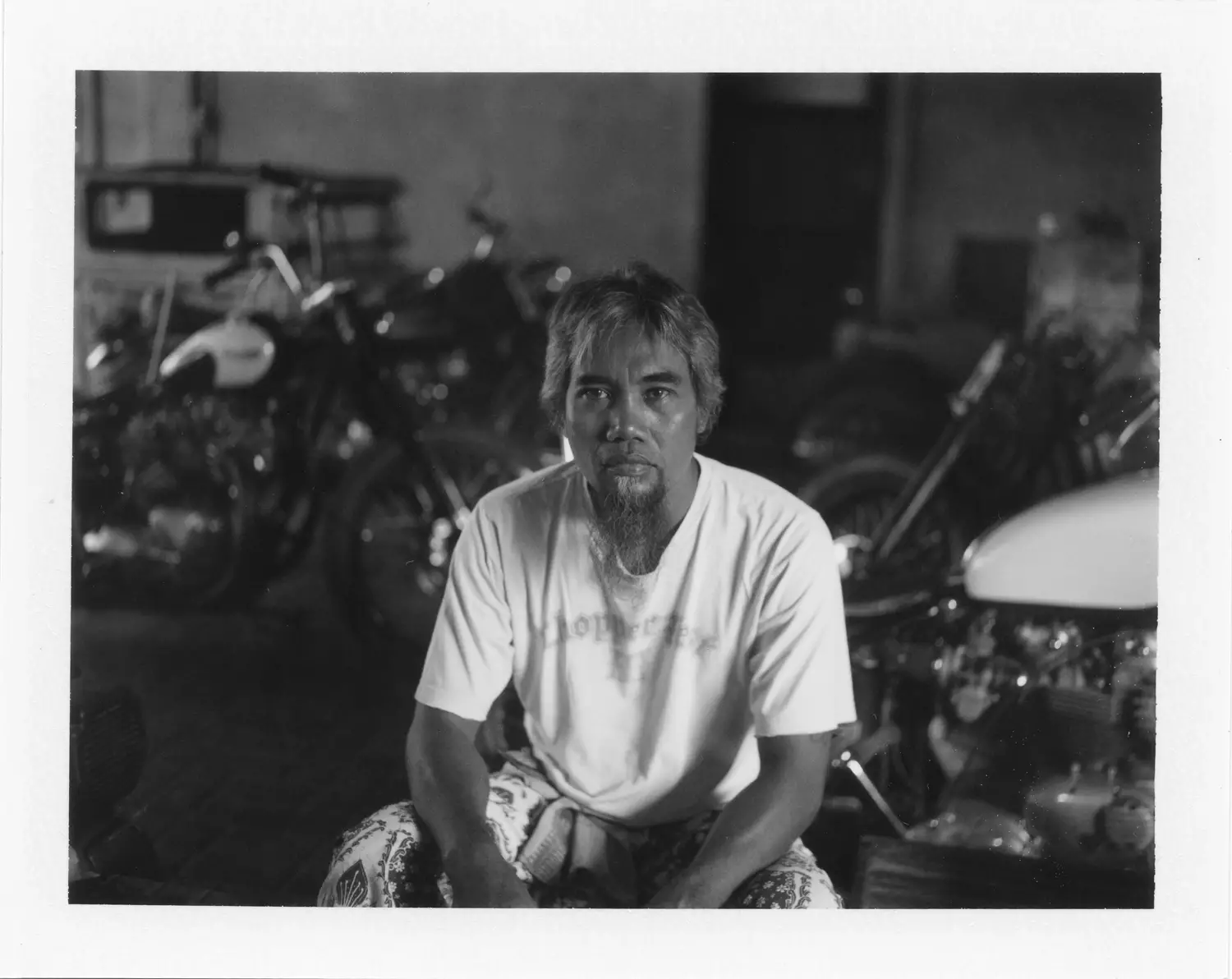
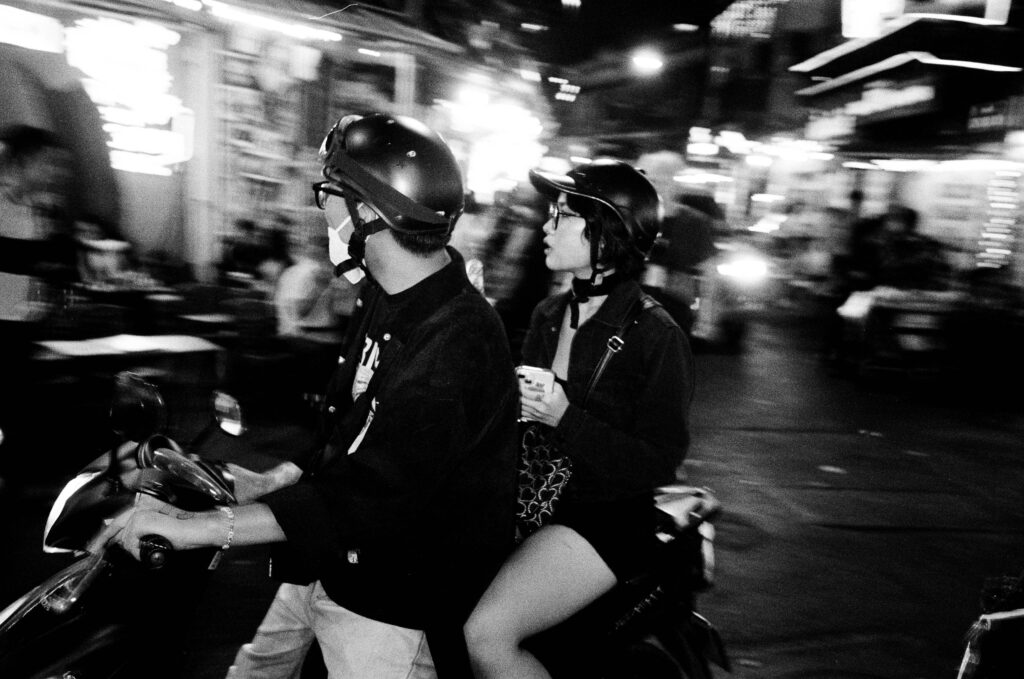
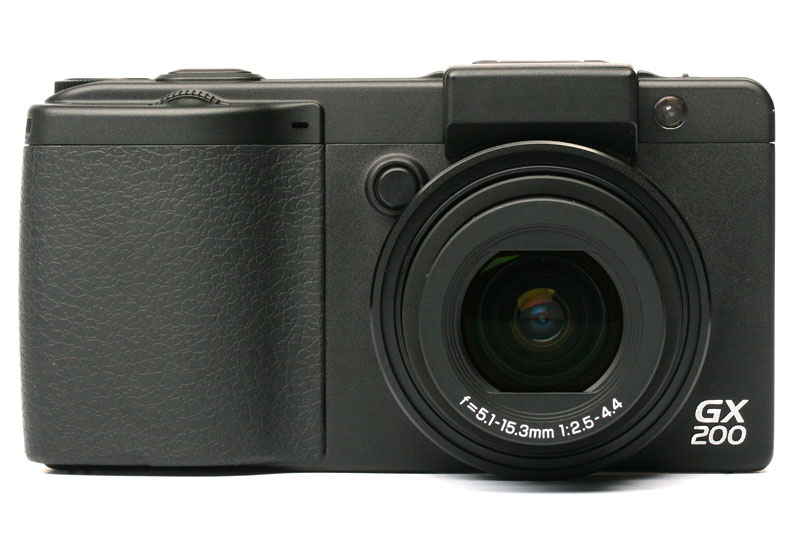
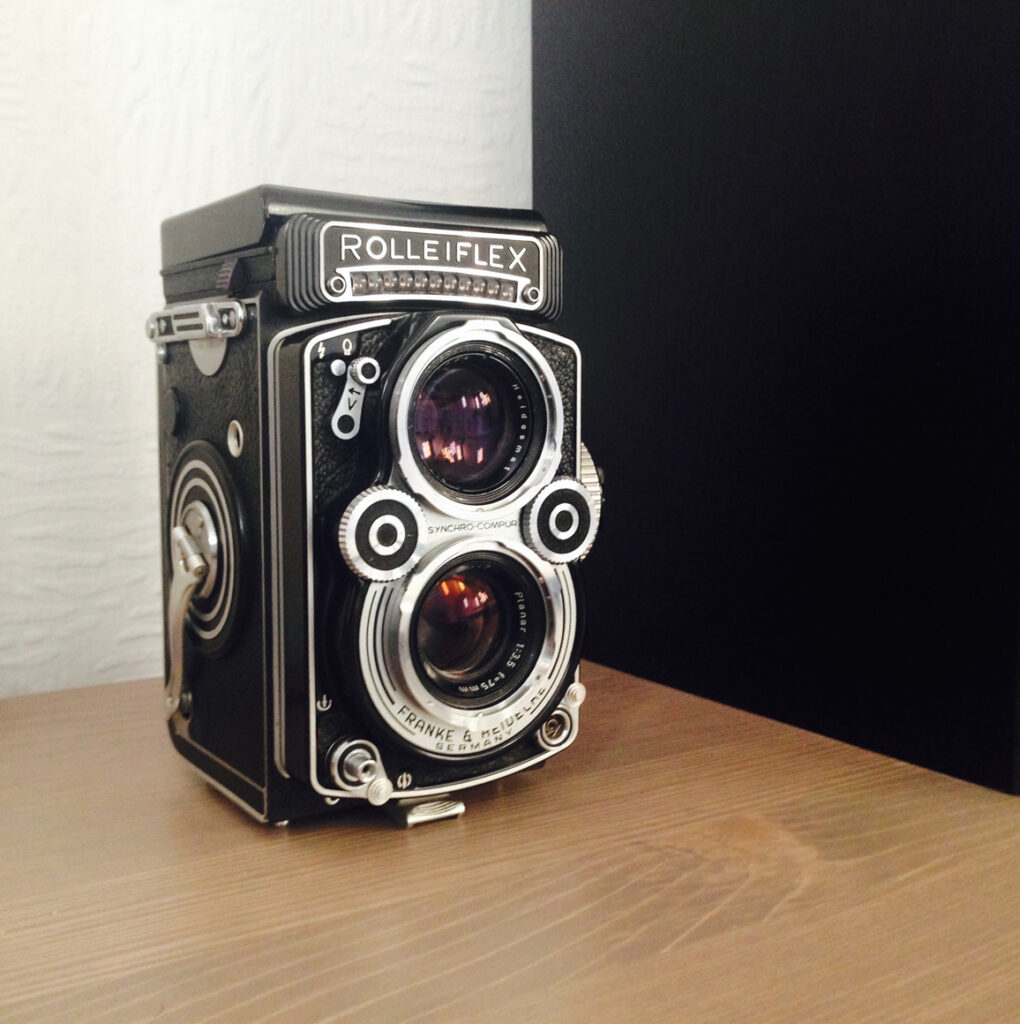
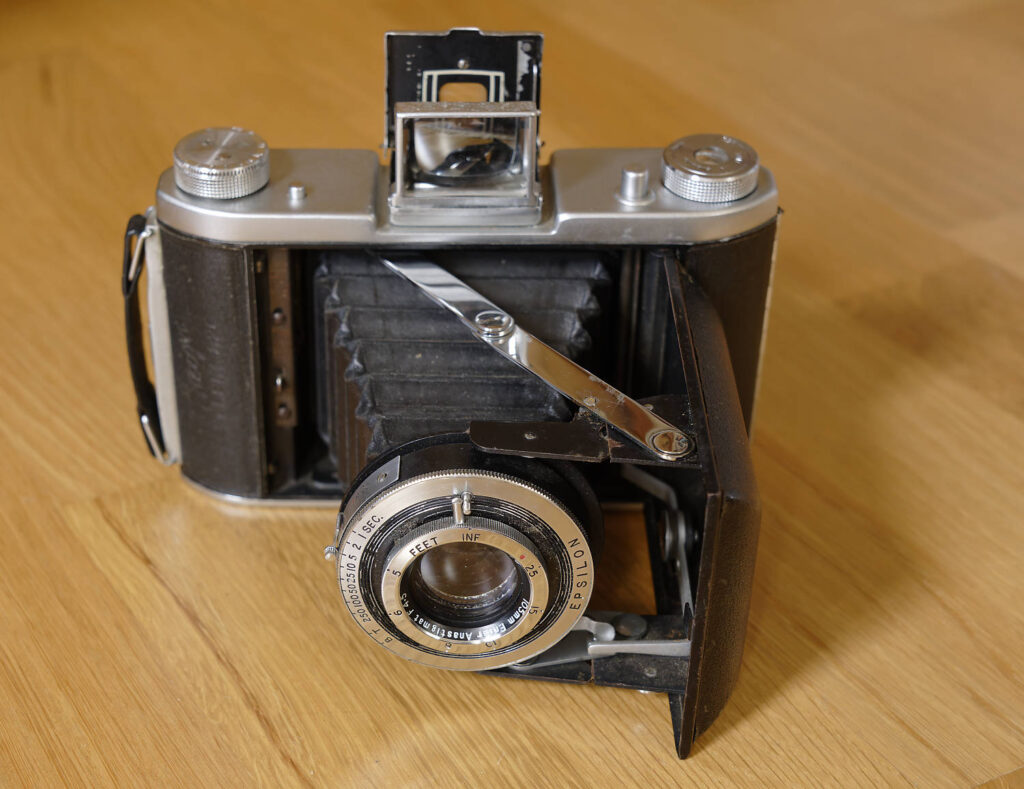




Comments
julianhiggs on The Making of the POLARACER project – Shooting the Custom Motorcycle Scene in Bali – By Carlos Albisu
Comment posted: 07/11/2018
Comment posted: 07/11/2018
Daniel Fjäll on The Making of the POLARACER project – Shooting the Custom Motorcycle Scene in Bali – By Carlos Albisu
Comment posted: 07/11/2018
I shot a ton of Instant film with my Polaroid 195 in Bali. Don't they just love the instant prints? I'm heading to Bali in December but with my Polaroid 600SE this time.
Comment posted: 07/11/2018
Comment posted: 07/11/2018
Comment posted: 07/11/2018
Comment posted: 07/11/2018